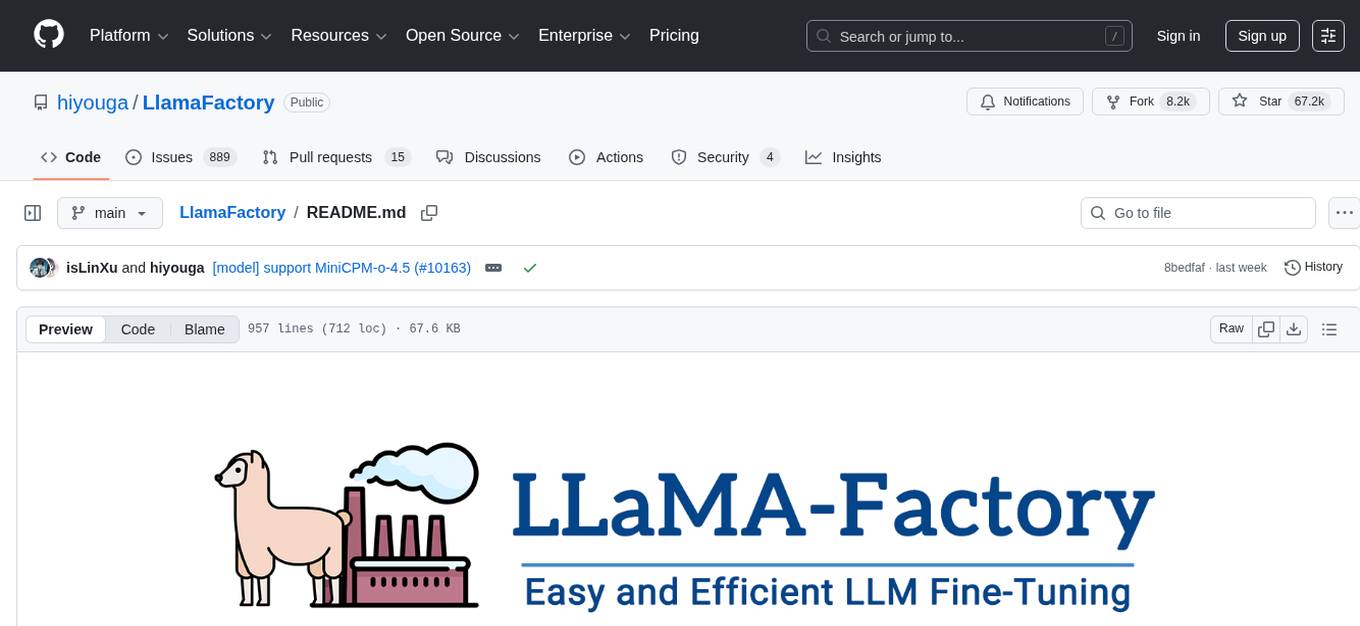
swift
ms-swift: Use PEFT or Full-parameter to finetune 300+ LLMs or 50+ MLLMs. (Qwen2, GLM4v, Internlm2.5, Yi, Llama3.1, Llava-Video, Internvl2, MiniCPM-V-2.6, Deepseek, Baichuan2, Gemma2, Phi3-Vision, ...)
Stars: 2734
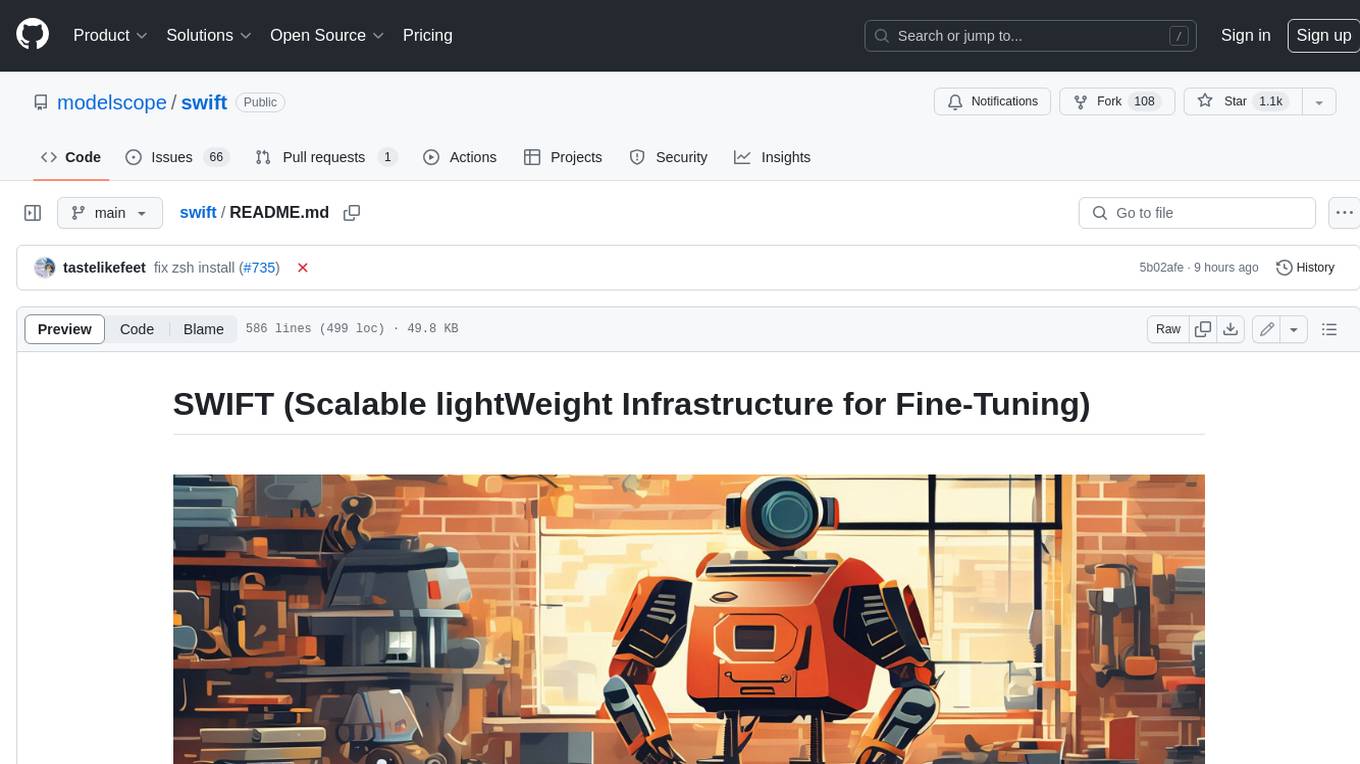
SWIFT (Scalable lightWeight Infrastructure for Fine-Tuning) supports training, inference, evaluation and deployment of nearly **200 LLMs and MLLMs** (multimodal large models). Developers can directly apply our framework to their own research and production environments to realize the complete workflow from model training and evaluation to application. In addition to supporting the lightweight training solutions provided by [PEFT](https://github.com/huggingface/peft), we also provide a complete **Adapters library** to support the latest training techniques such as NEFTune, LoRA+, LLaMA-PRO, etc. This adapter library can be used directly in your own custom workflow without our training scripts. To facilitate use by users unfamiliar with deep learning, we provide a Gradio web-ui for controlling training and inference, as well as accompanying deep learning courses and best practices for beginners. Additionally, we are expanding capabilities for other modalities. Currently, we support full-parameter training and LoRA training for AnimateDiff.
README:
ModelScope Community Website
中文   |   English  
SWIFT supports training(PreTraining/Fine-tuning/RLHF), inference, evaluation and deployment of 300+ LLMs and 50+ MLLMs (multimodal large models). Developers can directly apply our framework to their own research and production environments to realize the complete workflow from model training and evaluation to application. In addition to supporting the lightweight training solutions provided by PEFT, we also provide a complete Adapters library to support the latest training techniques such as NEFTune, LoRA+, LLaMA-PRO, etc. This adapter library can be used directly in your own custom workflow without our training scripts.
To facilitate use by users unfamiliar with deep learning, we provide a Gradio web-ui for controlling training and inference, as well as accompanying deep learning courses and best practices for beginners. SWIFT web-ui is available both on Huggingface space and ModelScope studio, please feel free to try!
SWIFT has rich documentations for users, please feel free to check our documentation website:
English Documentation   |   中文文档  
You can contact us and communicate with us by adding our group:
| Discord Group | 微信群 |
|---|---|
 |
 |
- 2024.08.06: Support for minicpm-v-v2_6-chat is available. You can use
swift infer --model_type minicpm-v-v2_6-chatfor inference experience. Best practices can be found here. - 2024.08.06: Supports internlm2.5 series of 1.8b and 20b. Experience it using
swift infer --model_type internlm2_5-1_8b-chat. - 🔥2024.08.05: Support evaluation for multi-modal models! Same command with new datasets.
- 🔥2024.08.02: Support Fourier Ft. Use
--sft_type fourierftto begin, Check parameter documentation here. - 🔥2024.07.29: Support the use of lmdeploy for inference acceleration of LLM and VLM models. Documentation can be found here.
- 🔥2024.07.24: Support DPO/ORPO/SimPO/CPO alignment algorithm for vision MLLM, training scripts can be find in Document. support RLAIF-V dataset.
- 🔥2024.07.24: Support using Megatron for CPT and SFT on the Qwen2 series. You can refer to the Megatron training documentation.
- 🔥2024.07.24: Support for the llama3.1 series models, including 8b, 70b, and 405b. Support for openbuddy-llama3_1-8b-chat.
- 2024.07.20: Support mistral-nemo series models. Use
--model_type mistral-nemo-base-2407and--model_type mistral-nemo-instruct-2407to begin. - 2024.07.19: Support Q-Galore, this algorithm can reduce the training memory cost by 60% (qwen-7b-chat, full, 80G -> 35G), use
swift sft --model_type xxx --use_galore true --galore_quantization trueto begin! - 2024.07.17: Support newly released InternVL2 models:
model_typeare internvl2-1b, internvl2-40b, internvl2-llama3-76b. For best practices, refer to here. - 2024.07.17: Support the training and inference of NuminaMath-7B-TIR. Use with model_type
numina-math-7b. - 🔥2024.07.16: Support exporting for ollama and bitsandbytes. Use
swift export --model_type xxx --to_ollama trueorswift export --model_type xxx --quant_method bnb --quant_bits 4 - 2024.07.08: Support cogvlm2-video-13b-chat. You can check the best practice here.
- 2024.07.08: Support internlm-xcomposer2_5-7b-chat. You can check the best practice here.
- 🔥2024.07.06: Support for the llava-next-video series models: llava-next-video-7b-instruct, llava-next-video-7b-32k-instruct, llava-next-video-7b-dpo-instruct, llava-next-video-34b-instruct. You can refer to llava-video best practice for more information.
- 🔥2024.07.06: Support InternVL2 series: internvl2-2b, internvl2-4b, internvl2-8b, internvl2-26b.
- 2024.07.06: Support codegeex4-9b-chat.
- 2024.07.04: Support internlm2_5-7b series: internlm2_5-7b, internlm2_5-7b-chat, internlm2_5-7b-chat-1m.
- 2024.07.02: Support for using vLLM for accelerating inference and deployment of multimodal large models such as the llava series and phi3-vision models. You can refer to the Multimodal & vLLM Inference Acceleration Documentation for more information.
- 2024.07.02: Support for
llava1_6-vicuna-7b-instruct,llava1_6-vicuna-13b-instructand other llava-hf models. For best practices, refer to here. - 🔥2024.06.29: Support eval-scope&open-compass for evaluation! Now we have supported over 50 eval datasets like
BoolQ, ocnli, humaneval, math, ceval, mmlu, gsk8k, ARC_e, please check our Eval Doc to begin! Next sprint we will support Multi-modal and Agent evaluation, remember to follow us : )
More
- 🔥2024.06.28: Support for Florence series model! See document
- 🔥2024.06.28: Support for Gemma2 series models: gemma2-9b, gemma2-9b-instruct, gemma2-27b, gemma2-27b-instruct.
- 🔥2024.06.18: Supports DeepSeek-Coder-v2 series model! Use model_type
deepseek-coder-v2-instructanddeepseek-coder-v2-lite-instructto begin. - 🔥2024.06.16: Supports KTO and CPO training! See document to start training!
- 2024.06.11: Support for tool-calling agent deployment that conform to the OpenAI interface.You can refer to Agent deployment best practice
- 🔥2024.06.07: Support Qwen2 series LLM, including Base and Instruct models of 0.5B, 1.5B, 7B, and 72B, as well as corresponding quantized versions gptq-int4, gptq-int8, and awq-int4. The best practice for self-cognition fine-tuning, inference and deployment of Qwen2-72B-Instruct using dual-card 80GiB A100 can be found here.
- 🔥2024.06.05: Support for glm4 series LLM and glm4v-9b-chat MLLM. You can refer to glm4v best practice.
- 🔥2024.06.01: Supports SimPO training! See document to start training!
- 🔥2024.06.01: Support for deploying large multimodal models, please refer to the Multimodal Deployment Documentation for more information.
- 2024.05.31: Supports Mini-Internvl model, Use model_type
mini-internvl-chat-2b-v1_5andmini-internvl-chat-4b-v1_5to train. - 2024.05.24: Supports Phi3-vision model, Use model_type
phi3-vision-128k-instructto train. - 2024.05.22: Supports DeepSeek-V2-Lite series models, model_type are
deepseek-v2-liteanddeepseek-v2-lite-chat - 2024.05.22: Supports TeleChat-12B-v2 model with quantized version, model_type are
telechat-12b-v2andtelechat-12b-v2-gptq-int4 - 🔥2024.05.21: Inference and fine-tuning support for MiniCPM-Llama3-V-2_5 are now available. For more details, please refer to minicpm-v-2.5 Best Practice.
- 🔥2024.05.20: Support for inferencing and fine-tuning cogvlm2-llama3-chinese-chat-19B, cogvlm2-llama3-chat-19B. you can refer to cogvlm2 Best Practice.
- 🔥2024.05.17: Support peft=0.11.0. Meanwhile support 3 new tuners:
BOFT,VeraandPissa. use--sft_type boft/verato use BOFT or Vera, use--init_lora_weights pissawith--sft_type lorato use Pissa. - 2024.05.16: Supports Llava-Next (Stronger) series models. For best practice, you can refer to here.
- 🔥2024.05.13: Support Yi-1.5 series models,use
--model_type yi-1_5-9b-chatto begin! - 2024.05.11: Support for qlora training and quantized inference using hqq and eetq. For more information, see the LLM Quantization Documentation.
- 2024.05.10: Support split a sequence to multiple GPUs to reduce memory usage. Use this feature by
pip install .[seq_parallel], then add--sequence_parallel_size nto your DDP script to begin! - 2024.05.08: Support DeepSeek-V2-Chat model, you can refer to this script.Support InternVL-Chat-V1.5-Int8 model, for best practice, you can refer to here.
- 🔥2024.05.07: Supoprts ORPO training! See document to start training!
- 2024.05.07: Supports Llava-Llama3 model from xtuner,model_type is
llava-llama-3-8b-v1_1. - 2024.04.29: Supports inference and fine-tuning of InternVL-Chat-V1.5 model. For best practice, you can refer to here.
- 🔥2024.04.26: Support LISA and unsloth training! Specify
--lisa_activated_layers=2to use LISA(to reduce the memory cost to 30 percent!), specify--tuner_backend unslothto use unsloth to train a huge model(full or lora) with lesser memory(30 percent or lesser) and faster speed(5x)! - 🔥2024.04.26: Support the fine-tuning and inference of Qwen1.5-110B and Qwen1.5-110B-Chat model, use this script to start training!
- 2024.04.24: Support for inference and fine-tuning of Phi3 series models. Including: phi3-4b-4k-instruct, phi3-4b-128k-instruct.
- 2024.04.22: Support for inference, fine-tuning, and deployment of chinese-llama-alpaca-2 series models. This includes:chinese-llama-2-1.3b, chinese-llama-2-7b, chinese-llama-2-13b, chinese-alpaca-2-1.3b, chinese-alpaca-2-7b and chinese-alpaca-2-13b along with their corresponding 16k and 64k long text versions.
- 2024.04.22: Support for inference and fine-tuning of Llama3 GPTQ-Int4, GPTQ-Int8, and AWQ series models. Support for inference and fine-tuning of chatglm3-6b-128k, Openbuddy-Llama3.
- 2024.04.20: Support for inference, fine-tuning, and deployment of Atom series models. This includes: Atom-7B and Atom-7B-Chat. use this script to train.
- 2024.04.19: Support for single-card, DDP, ZeRO2, and ZeRO3 training and inference with NPU, please refer to NPU Inference and Fine-tuning Best Practice.
- 2024.04.19: Support for inference, fine-tuning, and deployment of Llama3 series models. This includes: Llama-3-8B, Llama-3-8B-Instruct, Llama-3-70B, and Llama-3-70B-Instruct. use this script to train.
- 2024.04.18: Supported models: wizardlm2-7b-awq, wizardlm2-8x22b, yi-6b-chat-awq, yi-6b-chat-int8, yi-34b-chat-awq, yi-34b-chat-int8. Supported
--deepspeed zero3-offloadand provided default zero3-offload configuration file for zero3+cpu offload usage. - 2024.04.18: Supported compatibility with HuggingFace ecosystem using the environment variable
USE_HF, switching to use models and datasets from HF. Please refer to the HuggingFace ecosystem compatibility documentation. - 2024.04.17: Support the evaluation for OpenAI standard interfaces. Check the parameter documentation for details.
- 🔥2024.04.17: Support CodeQwen1.5-7B series: CodeQwen1.5-7B, CodeQwen1.5-7B-Chat,CodeQwen1.5-7B-Chat-AWQ, use this script to train.
- 2024.04.16: Supports inference and fine-tuning of llava-v1.6-34b model. For best practice, you can refer to here.
- 2024.04.13: Support the fine-tuning and inference of Mixtral-8x22B-v0.1 model, use this script to start training!
- 2024.04.13: Support the newly launched MiniCPM series: MiniCPM-V-2.0、MiniCPM-2B-128k、MiniCPM-MoE-8x2B and MiniCPM-1B.use this script to start training!
- 🔥2024.04.11: Support Model Evaluation with MMLU/ARC/CEval datasets(also user custom eval datasets) with one command! Check this documentation for details. Meanwhile, we support a trick way to do multiple ablation experiments, check this documentation to use.
- 🔥2024.04.11: Support c4ai-command-r series: c4ai-command-r-plus, c4ai-command-r-v01, use this script to train.
- 2024.04.10: Use SWIFT to fine-tune the qwen-7b-chat model to enhance its function call capabilities, and combine it with Modelscope-Agent for best practices, which can be found here.
- 🔥2024.04.09: Support ruozhiba dataset. Search
ruozhibain this documentation to begin training! - 2024.04.08: Support the fine-tuning and inference of XVERSE-MoE-A4.2B model, use this script to start training!
- 2024.04.04: Support QLoRA+FSDP to train a 70B model with two 24G memory GPUs, use this script to train.
- 🔥2024.04.03: Support Qwen1.5-32B series: Qwen1.5-32B, Qwen1.5-32B-Chat, Qwen1.5-32B-Chat-GPTQ-Int4.use this script to start training!
- 🔥2024.04.02: Support the fine-tuning and inference of Mengzi3-13B-Base model, use this script to start training!
- 🔥2024.04.01: Support dbrx series: dbrx-base and dbrx-instruct, use this script to start training!
- 🔥2024.03.29: Support Qwen1.5-MoE series: Qwen1.5-MoE-A2.7B, Qwen1.5-MoE-A2.7B-Chat, Qwen1.5-MoE-A2.7B-Chat-GPTQ-Int4.
- 🔥2024.03.29: Support the fine-tuning and inference of Grok-1 300B MoE, please view details here.
- 🔥2024.03.25: Supports inference and fine-tuning of TeleChat-7b and TeleChat-12b model, use this script to start training!
- 🔥2024.03.20: Supports inference and fine-tuning for the llava series. For best practice, you can refer to here.
- 🔥2024.03.12: Support inference and fine-tuning for deepseek-vl series. Best practices can be found here.
- 🔥2024.03.11: Support GaLore for effectively reducing memory usage to 1/2 of the original in full-parameter training.
- 🔥2024.03.10: End-to-end best practices from fine-tuning to deployment for Qwen1.5-7B-Chat and Qwen1.5-72B-Chat.
- 🔥2024.03.09: Support training and inference of MAMBA model, use this script to start training!
- 2024.03.09: Support training and inference of AQLM quantized model, use this script to start training!
- 2024.03.06: Support training and inference of AWQ quantized model, use this Qwen1.5-AWQ model script to start training, and support training and inference of yi-9b.
- 🔥2024.02.29: Support LLaMA PRO, simply use this script to start training.
- 🔥2024.02.29: Support LoRA+, simply use this script to start training.
- 2024.02.25: Support
swift exportto quantize models using AWQ/GPTQ and push to ModelScope Hub. See documentation: LLM Quantization. - 2024.02.22: Support gemma series: gemma-2b, gemma-2b-instruct, gemma-7b, gemma-7b-instruct.
- 2024.02.16: Support deepseek-math series: deepseek-math-7b, deepseek-math-7b-instruct, deepseek-math-7b-chat.
- 🔥2024.02.05: Support Qwen1.5 series models, see model list for all supported Qwen1.5 models. Provide fine-tuning scripts for qwen1half-7b-chat, qwen1half-7b-chat-int8.
- 2024.02.05: Support training of diffusion models such as SDXL, SD, ControlNet, as well as DreamBooth training. See corresponding training scripts for details.
- 2024.02.01: Support minicpm series: minicpm-2b-sft-chat, minicpm-2b-chat.
- 🔥2024.02.01: Support dataset mixing to reduce catastrophic forgetting. Use
--train_dataset_mix_ratio 2.0to enable training! We also open sourced the general knowledge dataset ms-bench. - 🔥2024.02.01: Support Agent training! Agent training algorithm is derived from this paper. We also added ms-agent, a high-quality agent dataset. Use this script to start Agent training!
- 🔥2024.02.01: Support adding SFT loss in DPO training to reduce repetitive generation caused by KL divergence loss.
- 2024.02.01: Support using AdaLoRA and IA3 adapters in training.
- 2024.02.01: Support
--merge_loraparameter in AnimateDiff training. - 2024.01.30: Support internlm-xcomposer2-7b-chat.
- 🔥2024.01.30: Support ZeRO-3, simply specify
--deepspeed default-zero3. - 2024.01.29: Support internlm2-math series: internlm2-math-7b, internlm2-math-7b-chat, internlm2-math-20b, internlm2-math-20b-chat.
- 🔥2024.01.26: Support yi-vl-6b-chat, yi-vl-34b-chat.
- 2024.01.24: Support codefuse-codegeex2-6b-chat, codefuse-qwen-14b-chat.
- 2024.01.23: Support orion series: orion-14b, orion-14b-chat.
- 2024.01.20: Support xverse-13b-256k, xverse-65b-v2, xverse-65b-chat.
- 🔥2024.01.17: Support internlm2 series: internlm2-7b-base, internlm2-7b, internlm2-7b-sft-chat, internlm2-7b-chat, internlm2-20b-base, internlm2-20b, internlm2-20b-sft-chat, internlm2-20b-chat.
- 2024.01.15: Support yuan series: yuan2-2b-instruct, yuan2-2b-janus-instruct, yuan2-51b-instruct, yuan2-102b-instruct.
- 🔥2024.01.12: Support deepseek-moe series: deepseek-moe-16b, deepseek-moe-16b-chat.
- 🔥2024.01.04: Support VLLM deployment, compatible with OpenAI API style, see VLLM Inference Acceleration and Deployment for details.
- 2024.01.04: Update Benchmark for convenient viewing of training speed and memory usage of different models.
- 🔥2023.12.29: Support web-ui for sft training and inference, use
swift web-uiafter installing ms-swift to start. - 🔥2023.12.29: Support DPO RLHF (Reinforcement Learning from Human Feedback) and three datasets for this task: AI-ModelScope/stack-exchange-paired, AI-ModelScope/hh-rlhf and AI-ModelScope/hh_rlhf_cn. See documentation to start training!
- 🔥2023.12.28: Support SCEdit! This tuner can significantly reduce memory usage in U-Net and support low-memory controllable image generation (replacing ControlNet), read the section below to learn more.
- 2023.12.23: Support codegeex2-6b.
- 2023.12.19: Support phi2-3b.
- 2023.12.18: Support VLLM for inference acceleration.
- 2023.12.15: Support deepseek, deepseek-coder series: deepseek-7b, deepseek-7b-chat, deepseek-67b, deepseek-67b-chat, openbuddy-deepseek-67b-chat, deepseek-coder-1_3b, deepseek-coder-1_3b-instruct, deepseek-coder-6_7b, deepseek-coder-6_7b-instruct, deepseek-coder-33b, deepseek-coder-33b-instruct.
- 2023.12.13: Support mistral-7b-instruct-v2, mixtral-moe-7b, mixtral-moe-7b-instruct.
- 2023.12.09: Support
freeze_parametersparameter as a compromise between lora and full-parameter training. Corresponding sh can be found in full_freeze_ddp. Supportdisable_tqdm,lazy_tokenize,preprocess_num_procparameters, see command line arguments for details. - 2023.12.08: Support sus-34b-chat, support yi-6b-200k, yi-34b-200k.
- 2023.12.07: Support Multi-Node DDP training.
- 2023.12.05: Support models: zephyr-7b-beta-chat, openbuddy-zephyr-7b-chat. Support datasets: hc3-zh, hc3-en.
- 🔥2023.12.02: Self-cognition fine-tuning best practices, 10 minutes to fine-tune a large model for self-cognition, create your own unique large model.
- 🔥2023.11.30: Support training and inference of qwen-1_8b, qwen-72b, qwen-audio series models. Corresponding sh scripts can be found in qwen_1_8b_chat, qwen_72b_chat, qwen_audio_chat
- 🔥2023.11.29: Support training and inference of AnimateDiff
- 🔥2023.11.24: Support yi-34b-chat, codefuse-codellama-34b-chat models. Corresponding sh scripts can be found in yi_34b_chat, codefuse_codellama_34b_chat.
- 🔥2023.11.18: Support tongyi-finance-14b series models: tongyi-finance-14b, tongyi-finance-14b-chat, tongyi-finance-14b-chat-int4. Corresponding sh scripts can be found in tongyi_finance_14b_chat_int4.
- 2023.11.16: Support flash attn for more models: qwen series, qwen-vl series, llama series, openbuddy series, mistral series, yi series, ziya series. Please use
use_flash_attnparameter. - 🔥2023.11.11: Support NEFTune, simply use
Swift.prepare_model(model, NEFTuneConfig())to enable. - 🔥2023.11.11: Support training and inference by command line and inference by Web-UI, see
Usage with Swift CLIsection below for details. - 🔥2023.11.10: Support bluelm series models: bluelm-7b, bluelm-7b-chat, bluelm-7b-32k, bluelm-7b-chat-32k. Corresponding sh scripts can be found in bluelm_7b_chat.
- 🔥2023.11.08: Support training and inference of xverse-65b model, script at xverse_65b.
- 🔥2023.11.07: Support training and inference of yi-6b, yi-34b models, scripts at yi_6b, yi_34b.
- 🔥2023.10.30: Support two new tuners: QA-LoRA and LongLoRA.
- 🔥2023.10.30: Support editing models using ROME (Rank One Model Editing) to infuse new knowledge into models without training!
- 2023.10.30: Support skywork-13b series models: skywork-13b, skywork-13b-chat. Corresponding sh scripts can be found in skywork_13b.
- 🔥2023.10.27: Support chatglm3 series models: chatglm3-6b-base, chatglm3-6b, chatglm3-6b-32k. Corresponding sh scripts can be found in chatglm3_6b.
- 🔥2023.10.17: Support SFT of int4, int8 models: qwen-7b-chat-int4, qwen-14b-chat-int4, qwen-vl-chat-int4, baichuan2-7b-chat-int4, baichuan2-13b-chat-int4, qwen-7b-chat-int8, qwen-14b-chat-int8.
- 2023.10.15: Support ziya2-13b series models: ziya2-13b, ziya2-13b-chat.
- 2023.10.12: Support mistral-7b series models: openbuddy-mistral-7b-chat, mistral-7b, mistral-7b-instruct.
- 🔥2023.10.07: Support DeepSpeed ZeRO-2, enabling lora (not just qlora) to run DDP on dual A10 cards.
- 2023.10.04: Support more math, law, SQL, code domain datasets: blossom-math-zh, school-math-zh, text2sql-en, sql-create-context-en, lawyer-llama-zh, tigerbot-law-zh, leetcode-python-en.
- 🔥2023.09.25: Support qwen-14b series: qwen-14b, qwen-14b-chat.
- 2023.09.18: Support internlm-20b series: internlm-20b, internlm-20b-chat.
- 2023.09.12: Support MP+DDP to accelerate full-parameter training.
- 2023.09.05: Support openbuddy-llama2-70b-chat.
- 2023.09.03: Support baichuan2 series: baichuan2-7b, baichuan2-7b-chat, baichuan2-13b, baichuan2-13b-chat.
SWIFT runs in the Python environment. Please ensure your Python version is higher than 3.8.
- Method 1: Install SWIFT using pip command:
# Full capabilities
pip install 'ms-swift[all]' -U
# LLM only
pip install 'ms-swift[llm]' -U
# AIGC only
pip install 'ms-swift[aigc]' -U
# Adapters only
pip install ms-swift -U- Method 2: Install SWIFT through source code (convenient for running training and inference scripts), please run the following commands:
git clone https://github.com/modelscope/swift.git
cd swift
pip install -e '.[llm]'SWIFT depends on torch>=1.13, recommend torch>=2.0.0.
- Method 3: Use SWIFT in our Docker image
# China-Hangzhou image
docker pull registry.cn-hangzhou.aliyuncs.com/modelscope-repo/modelscope:ubuntu22.04-cuda12.1.0-py310-torch2.1.2-tf2.14.0-1.13.1
# US-west image
docker pull registry.us-west-1.aliyuncs.com/modelscope-repo/modelscope:ubuntu22.04-cuda12.1.0-py310-torch2.1.2-tf2.14.0-1.13.1This section introduces basic usage, see the Documentation section for more ways to use.
Web-UI is a gradio-based interface for zero-threshold training and deployment. It is easy to use and perfectly supports multi-GPU training and deployment:
SWIFT_UI_LANG=en swift web-uiYou can refer to the following scripts to customize your own training script.
- full: qwen1half-7b-chat (A100), qwen-7b-chat (2*A100)
- full+ddp+zero2: qwen-7b-chat (4*A100)
- full+ddp+zero3: qwen-14b-chat (4*A100)
- lora: chatglm3-6b (3090), baichuan2-13b-chat (2*3090), yi-34b-chat (A100), qwen-72b-chat (2*A100)
- lora+ddp: chatglm3-6b (2*3090)
- lora+ddp+zero3: qwen-14b-chat (4*3090), qwen-72b-chat (4*A100)
- qlora(gptq-int4): qwen-7b-chat-int4 (3090)
- qlora(gptq-int8): qwen1half-7b-chat-int8 (3090)
- qlora(bnb-int4): qwen-7b-chat (3090)
| Training Process | Training Method |
|---|---|
| Pretraining | Text Generation |
| Fine-tuning | Single-turn/Multi-turn Agent Training/Self-cognition Multi-modal Vision/Multi-modal Speech |
| Human Alignment | DPO ORPO SimPO CPO KTO |
| Text-to-Image | DreamBooth, etc. |
| Text-to-Video | - |
Start single GPU fine-tuning with the following command:
LoRA:
# Experimental Environment: A100
# GPU Memory Requirement: 20GB
# Runtime: 3.1 hours
CUDA_VISIBLE_DEVICES=0 \
swift sft \
--model_type qwen1half-7b-chat \
--dataset blossom-math-zh \
--num_train_epochs 5 \
--sft_type lora \
--output_dir output \
--eval_steps 200 \Full-parameter:
# Experimental Environment: A100
# GPU Memory Requirement: 80GB
# Runtime: 2.5 hours
CUDA_VISIBLE_DEVICES=0 \
swift sft \
--model_type qwen1half-7b-chat \
--dataset blossom-math-zh \
--num_train_epochs 5 \
--sft_type full \
--output_dir output \
--eval_steps 500 \# Experimental Environment: 2 * A100
# GPU Memory Requirement: 10GB + 13GB
# Runtime: 3.4 hours
CUDA_VISIBLE_DEVICES=0,1 \
swift sft \
--model_type qwen1half-7b-chat \
--dataset blossom-math-zh \
--num_train_epochs 5 \
--sft_type lora \
--output_dir output \# Experimental Environment: 4 * A100
# GPU Memory Requirement: 4 * 30GB
# Runtime: 0.8 hours
NPROC_PER_NODE=4 \
CUDA_VISIBLE_DEVICES=0,1,2,3 \
swift sft \
--model_type qwen1half-7b-chat \
--dataset blossom-math-zh \
--num_train_epochs 5 \
--sft_type lora \
--output_dir output \Combining Model Parallelism and Data Parallelism:
# Experimental Environment: 4 * A100
# GPU Memory Requirement: 2*14GB + 2*18GB
# Runtime: 1.7 hours
NPROC_PER_NODE=2 \
CUDA_VISIBLE_DEVICES=0,1,2,3 \
swift sft \
--model_type qwen1half-7b-chat \
--dataset blossom-math-zh \
--num_train_epochs 5 \
--sft_type lora \
--output_dir output \Deepspeed supports training of quantized GPTQ and AWQ models.
ZeRO2:
# Experimental Environment: 4 * A100
# GPU Memory Requirement: 4 * 21GB
# Runtime: 0.9 hours
NPROC_PER_NODE=4 \
CUDA_VISIBLE_DEVICES=0,1,2,3 \
swift sft \
--model_type qwen1half-7b-chat \
--dataset blossom-math-zh \
--num_train_epochs 5 \
--sft_type lora \
--output_dir output \
--deepspeed default-zero2 \ZeRO3:
# Experimental Environment: 4 * A100
# GPU Memory Requirement: 4 * 19GB
# Runtime: 3.2 hours
NPROC_PER_NODE=4 \
CUDA_VISIBLE_DEVICES=0,1,2,3 \
swift sft \
--model_type qwen1half-7b-chat \
--dataset blossom-math-zh \
--num_train_epochs 5 \
--sft_type lora \
--output_dir output \
--deepspeed default-zero3 \ZeRO3-Offload:
# Experimental Environment: 4 * A100
# GPU Memory Requirement: 4 * 12GB
# Runtime: 60 hours
NPROC_PER_NODE=4 \
CUDA_VISIBLE_DEVICES=0,1,2,3 \
swift sft \
--model_id_or_path AI-ModelScope/WizardLM-2-8x22B \
--dataset blossom-math-zh \
--num_train_epochs 5 \
--sft_type lora \
--output_dir output \
--deepspeed zero3-offload \# If the disk is not shared, please additionally specify `--save_on_each_node true` in the shell scripts on each machine.
# node0
CUDA_VISIBLE_DEVICES=0,1,2,3,4,5,6,7 \
NNODES=2 \
NODE_RANK=0 \
MASTER_ADDR=127.0.0.1 \
NPROC_PER_NODE=8 \
swift sft \
--model_type qwen1half-32b-chat \
--sft_type full \
--dataset blossom-math-zh \
--output_dir output \
--deepspeed default-zero3 \
# node1
CUDA_VISIBLE_DEVICES=0,1,2,3,4,5,6,7 \
NNODES=2 \
NODE_RANK=1 \
MASTER_ADDR=xxx.xxx.xxx.xxx \
NPROC_PER_NODE=8 \
swift sft \
--model_type qwen1half-32b-chat \
--sft_type full \
--dataset blossom-math-zh \
--output_dir output \
--deepspeed default-zero3 \In DLC product, WORLD_SIZE is the node number, RANK is the node index, this is different from the definition of torchrun.
NNODES=$WORLD_SIZE \
NODE_RANK=$RANK \
swift sft \
--model_type qwen1half-32b-chat \
--sft_type full \
--dataset blossom-math-zh \
--output_dir output \
--deepspeed default-zero3# Experimental Environment: 4 * A100
# GPU Memory Requirement: 4 * 30GB
# Runtime: 0.8 hours
NPROC_PER_NODE=4 \
CUDA_VISIBLE_DEVICES=0,1,2,3 \
swift pt \
--model_type qwen1half-7b \
--dataset chinese-c4#100000 \
--num_train_epochs 1 \
--sft_type full \
--deepspeed default-zero3 \
--output_dir output \
--lazy_tokenize true# We support rlhf_type dpo/cpo/simpo/orpo/kto
CUDA_VISIBLE_DEVICES=0 \
swift rlhf \
--rlhf_type dpo \
--model_type qwen1half-7b-chat \
--dataset shareai-llama3-dpo-zh-en-emoji \
--num_train_epochs 5 \
--sft_type lora \
--output_dir output \Original model:
CUDA_VISIBLE_DEVICES=0 swift infer --model_type qwen1half-7b-chat
# use VLLM
CUDA_VISIBLE_DEVICES=0 swift infer --model_type qwen1half-7b-chat \
--infer_backend vllm --max_model_len 8192LoRA fine-tuned:
CUDA_VISIBLE_DEVICES=0 swift infer --ckpt_dir xxx/checkpoint-xxx --load_dataset_config true
# use VLLM
CUDA_VISIBLE_DEVICES=0 swift infer \
--ckpt_dir xxx/checkpoint-xxx --load_dataset_config true \
--merge_lora true --infer_backend vllm --max_model_len 8192Original model:
# We recommend using vLLM for acceleration (arc evaluated in half a minute)
CUDA_VISIBLE_DEVICES=0 swift eval --model_type qwen1half-7b-chat \
--eval_dataset ARC_e --infer_backend vllmLoRA fine-tuned:
CUDA_VISIBLE_DEVICES=0 swift eval --ckpt_dir xxx/checkpoint-xxx \
--eval_dataset ARC_e --infer_backend vllm \
--merge_lora true \Original model:
CUDA_VISIBLE_DEVICES=0 swift export --model_type qwen1half-7b-chat \
--quant_bits 4 --quant_method awqLoRA fine-tuned:
CUDA_VISIBLE_DEVICES=0 swift export \
--ckpt_dir xxx/checkpoint-xxx --load_dataset_config true \
--quant_method awq --quant_bits 4 \
--merge_lora true \The client uses the OpenAI API for invocation, for details refer to the LLM deployment documentation.
Original model:
CUDA_VISIBLE_DEVICES=0 swift deploy --model_type qwen1half-7b-chat
# 使用VLLM加速
CUDA_VISIBLE_DEVICES=0 swift deploy --model_type qwen1half-7b-chat \
--infer_backend vllm --max_model_len 8192LoRA fine-tuned:
CUDA_VISIBLE_DEVICES=0 swift deploy --ckpt_dir xxx/checkpoint-xxx
# 使用VLLM加速
CUDA_VISIBLE_DEVICES=0 swift deploy \
--ckpt_dir xxx/checkpoint-xxx --merge_lora true \
--infer_backend vllm --max_model_len 8192The complete list of supported models and datasets can be found at Supported Models and Datasets List.
| Model Type | Model Introduction | Language | Model Size | Model Type |
|---|---|---|---|---|
| Qwen Qwen1.5 Qwen2 |
Tongyi Qwen 1.0 and 1.5 series models | Chinese English |
0.5B-110B including quantized versions |
base model chat model MoE model code model |
| ChatGLM2 ChatGLM3 Codegeex2 GLM4 Codegeex4 |
Zhipu ChatGLM series models | Chinese English |
6B-9B | base model chat model code model long text model |
| Baichuan Baichuan2 |
Baichuan 1 and Baichuan 2 | Chinese English |
7B-13B including quantized versions |
base model chat model |
| Yuan2 | Langchao Yuan series models | Chinese English |
2B-102B | instruct model |
| XVerse | XVerse series models | Chinese English |
7B-65B | base model chat model long text model MoE model |
| LLaMA2 | LLaMA2 series models | English | 7B-70B including quantized versions |
base model chat model |
| LLaMA3 LLaMA3.1 |
LLaMA3 series models | English | 8B-70B including quantized versions |
base model chat model |
| Mistral Mixtral |
Mistral series models | English | 7B-22B | base model instruct model MoE model |
| Yi Yi1.5 |
01AI's YI series models | Chinese English |
6B-34B including quantized |
base model chat model long text model |
| InternLM InternLM2 InternLM2-Math InternLM2.5 |
Pujiang AI Lab InternLM series models | Chinese English |
1.8B-20B | base model chat model math model |
| DeepSeek DeepSeek-MoE DeepSeek-Coder DeepSeek-Math DeepSeek-V2 DeepSeek-Coder-V2 |
DeepSeek series models | Chinese English |
1.3B-236B | base model chat model MoE model code model math model |
| MAMBA | MAMBA temporal convolution model | English | 130M-2.8B | base model |
| Gemma Gemma2 |
Google Gemma series models | English | 2B-27B | base model instruct model |
| MiniCPM | OpenBmB MiniCPM series models | Chinese English |
2B-3B | chat model MoE model |
| OpenBuddy | OpenBuddy series models | Chinese English |
7B-70B | base model chat model |
| Orion | OrionStar AI series models | Chinese English |
14B | base model chat model |
| BlueLM | VIVO BlueLM large model | Chinese English |
7B | base model chat model |
| Ziya2 | Fengshenbang series models | Chinese English |
13B | base model chat model |
| Skywork | Skywork series models | Chinese English |
13B | base model chat model |
| Zephyr | Zephyr series models based on Mistral | English | 7B | chat model |
| PolyLM | Tongyi Lab self-developed PolyLM series models | Multilingual | 13B | base model |
| SeqGPT | Tongyi Lab self-developed text understanding model for information extraction and text classification | Chinese | 560M | semantic understanding model |
| SUS | Southern University of Science and Technology model fine-tuned on YI | Chinese English |
34B | chat model |
| Tongyi-Finance | Tongyi finance series models | Chinese English |
14B | base model chat model financial model |
| CodeFuse-CodeLLaMA CodeFuse-Codegeex2 CodeFuse-Qwen |
Ant CodeFuse series models | Chinese English |
6B-34B | chat model code model |
| phi2/phi3 | Microsoft's PHI series models | English | 3B/4B | base model instruct model code model |
| Grok | X-ai | English | 300B | base model |
| TeleChat | Tele-AI | Chinese English |
7B-12B | chat model |
| dbrx | databricks | English | 132B | base model chat model |
| mengzi3 | Langboat | Chinese English |
13B | base model |
| c4ai-command-r | c4ai | Multilingual | 35B-104B | chat model |
| WizardLM2 | WizardLM2 series models | English | 7B-8x22B including quantized versions |
chat model MoE model |
| Atom | Atom | Chinese | 7B | base model chat model |
| Chinese-LLaMA-Alpaca-2 | Chinese-LLaMA-Alpaca-2 | Chinese | 1.3B-13B | base model chat model long text model |
| Chinese-LLaMA-Alpaca-3 | Chinese-LLaMA-Alpaca-3 | Chinese | 8B | base model chat model |
| ModelScope-Agent | ModelScope Agent series models | Chinese | 7B-14B | agent model |
| Numina | AI-MO | English | 7B | Math |
| Model Type | Model Introduction | Language | Model Size | Model Type |
|---|---|---|---|---|
| Qwen-VL | Tongyi Qwen vision model | Chinese English |
7B including quantized versions |
base model chat model |
| Qwen-Audio | Tongyi Qwen speech model | Chinese English |
7B | base model chat model |
| YI-VL | 01AI's YI series vision models | Chinese English |
6B-34B | chat model |
| XComposer2 XComposer2.5 |
Pujiang AI Lab InternLM vision model | Chinese English |
7B | chat model |
| DeepSeek-VL | DeepSeek series vision models | Chinese English |
1.3B-7B | chat model |
| MiniCPM-V MiniCPM-V-2 MiniCPM-V-2.5 MiniCPM-V-2.6 |
OpenBmB MiniCPM vision model | Chinese English |
3B-9B | chat model |
| CogVLM CogAgent CogVLM2 CogVLM2-Video GLM4V |
Zhipu ChatGLM visual QA and Agent model | Chinese English |
9B-19B | chat model |
| Llava1.5 Llava1.6 |
Llava series models | English | 7B-34B | chat model |
| Llava-Next Llava-Next-Video |
Llava-Next series models | Chinese English |
7B-110B | chat model |
| mPLUG-Owl | mPLUG-Owl series models | English | 11B | chat model |
| InternVL Mini-InternVL InternVL2 |
InternVL | Chinese English |
1B-40B including quantized version |
chat model |
| Llava-llama3 | xtuner | English | 8B | chat model |
| Phi3-Vision | Microsoft | English | 4B | chat model |
| PaliGemma | English | 3B | chat model | |
| Florence | Microsoft | English | 0.23B-0.77B | chat model |
| Model Type | Model Introduction | Language | Model Type |
|---|---|---|---|
| AnimateDiff | AnimateDiff animation model | English | text-to-video |
| SD1.5/SD2.0/SDXL | StabilityAI series diffusion models | English | text-to-image |
| Dataset Type | Training Task | Documentation |
|---|---|---|
| General | Fine-tuning | 🔥ruozhiba, 🔥ms-bench, 🔥alpaca-en(gpt4), 🔥alpaca-zh(gpt4), multi-alpaca, instinwild, cot-en, cot-zh, firefly-zh, instruct-en, gpt4all-en, sharegpt, tulu-v2-sft-mixture, wikipedia-zh, open-orca, sharegpt-gpt4, deepctrl-sft, coig-cqia. |
| Agent | Fine-tuning | 🔥ms-agent, 🔥ms-agent-for-agentfabric, ms-agent-multirole, 🔥toolbench-for-alpha-umi, damo-agent-zh, damo-agent-zh-mini, agent-instruct-all-en. |
| General | Human Alignment | hh-rlhf, 🔥hh-rlhf-cn, stack-exchange-paired. |
| Code | Fine-tuning | code-alpaca-en, 🔥leetcode-python-en, 🔥codefuse-python-en, 🔥codefuse-evol-instruction-zh. |
| Medical | Fine-tuning | medical-en, medical-zh, 🔥disc-med-sft-zh. |
| Legal | Fine-tuning | lawyer-llama-zh, tigerbot-law-zh, 🔥disc-law-sft-zh. |
| Math | Fine-tuning | 🔥blossom-math-zh, school-math-zh, open-platypus-en. |
| SQL | Fine-tuning | text2sql-en, 🔥sql-create-context-en. |
| Text Generation | Fine-tuning | 🔥advertise-gen-zh, 🔥dureader-robust-zh. |
| Classification | Fine-tuning | cmnli-zh, 🔥jd-sentiment-zh, 🔥hc3-zh, 🔥hc3-en. |
| Quantization Assist | Quantization | pileval. |
| Other | Fine-tuning | finance-en, poetry-zh, webnovel-zh, generated-chat-zh, cls-fudan-news-zh, ner-jave-zh. |
| Vision | Fine-tuning | coco-en, 🔥coco-en-mini, coco-en-2, coco-en-2-mini, capcha-images. |
| Audio | Fine-tuning | aishell1-zh, 🔥aishell1-zh-mini. |
| Technology Name |
|---|
| 🔥LoRA: LORA: LOW-RANK ADAPTATION OF LARGE LANGUAGE MODELS |
| 🔥LoRA+: LoRA+: Efficient Low Rank Adaptation of Large Models |
| 🔥GaLore:GaLore: Memory-Efficient LLM Training by Gradient Low-Rank Projection |
| 🔥LISA: LISA: Layerwise Importance Sampling for Memory-Efficient Large Language Model Fine-Tuning |
| 🔥UnSloth: https://github.com/unslothai/unsloth |
| 🔥LLaMA PRO: LLAMA PRO: Progressive LLaMA with Block Expansion |
| 🔥SCEdit: SCEdit: Efficient and Controllable Image Diffusion Generation via Skip Connection Editing < arXiv \ |
| 🔥NEFTune: Noisy Embeddings Improve Instruction Finetuning |
| LongLoRA: Efficient Fine-tuning of Long-Context Large Language Models |
| Adapter: Parameter-Efficient Transfer Learning for NLP |
| Vision Prompt Tuning: Visual Prompt Tuning |
| Side: Side-Tuning: A Baseline for Network Adaptation via Additive Side Networks |
| Res-Tuning: Res-Tuning: A Flexible and Efficient Tuning Paradigm via Unbinding Tuner from Backbone < arXiv \ |
| Tuners provided by PEFT, such as IA3, AdaLoRA, etc. |
| Hardware Environment | Notes |
|---|---|
| CPU | |
| RTX 20/30/40 series, etc. | After 30 series, BF16 and FlashAttn can be used |
| Computing cards T4/V100, etc. | BF16 and FlashAttn not supported |
| Computing cards A10/A100, etc. | Support BF16 and FlashAttn |
| Huawei Ascend NPU |
- DATASET_ENABLE_CACHE: Enable cache when preprocess dataset, you can use
1/Trueor0/False, defaultFalse - WEBUI_SHARE: Share your web-ui, you can use
1/Trueor0/False, defaultFalse - SWIFT_UI_LANG: web-ui language, you can use
enorzh, defaultzh - WEBUI_SERVER: web-ui host ip,
0.0.0.0for all routes,127.0.0.1for local network only. Default127.0.0.1 - WEBUI_PORT: web-ui port
- USE_HF: Use huggingface endpoint or ModelScope endpoint to download models and datasets. you can use
1/Trueor0/False, defaultFalse - FORCE_REDOWNLOAD: Force to re-download the dataset
Other variables like CUDA_VISIBLE_DEVICES are also supported, which are not listed here.
This framework is licensed under the Apache License (Version 2.0). For models and datasets, please refer to the original resource page and follow the corresponding License.
@Misc{swift,
title = {SWIFT:Scalable lightWeight Infrastructure for Fine-Tuning},
author = {The ModelScope Team},
howpublished = {\url{https://github.com/modelscope/swift}},
year = {2024}
}For Tasks:
Click tags to check more tools for each tasksFor Jobs:
Alternative AI tools for swift
Similar Open Source Tools

swift
SWIFT (Scalable lightWeight Infrastructure for Fine-Tuning) supports training, inference, evaluation and deployment of nearly **200 LLMs and MLLMs** (multimodal large models). Developers can directly apply our framework to their own research and production environments to realize the complete workflow from model training and evaluation to application. In addition to supporting the lightweight training solutions provided by [PEFT](https://github.com/huggingface/peft), we also provide a complete **Adapters library** to support the latest training techniques such as NEFTune, LoRA+, LLaMA-PRO, etc. This adapter library can be used directly in your own custom workflow without our training scripts. To facilitate use by users unfamiliar with deep learning, we provide a Gradio web-ui for controlling training and inference, as well as accompanying deep learning courses and best practices for beginners. Additionally, we are expanding capabilities for other modalities. Currently, we support full-parameter training and LoRA training for AnimateDiff.
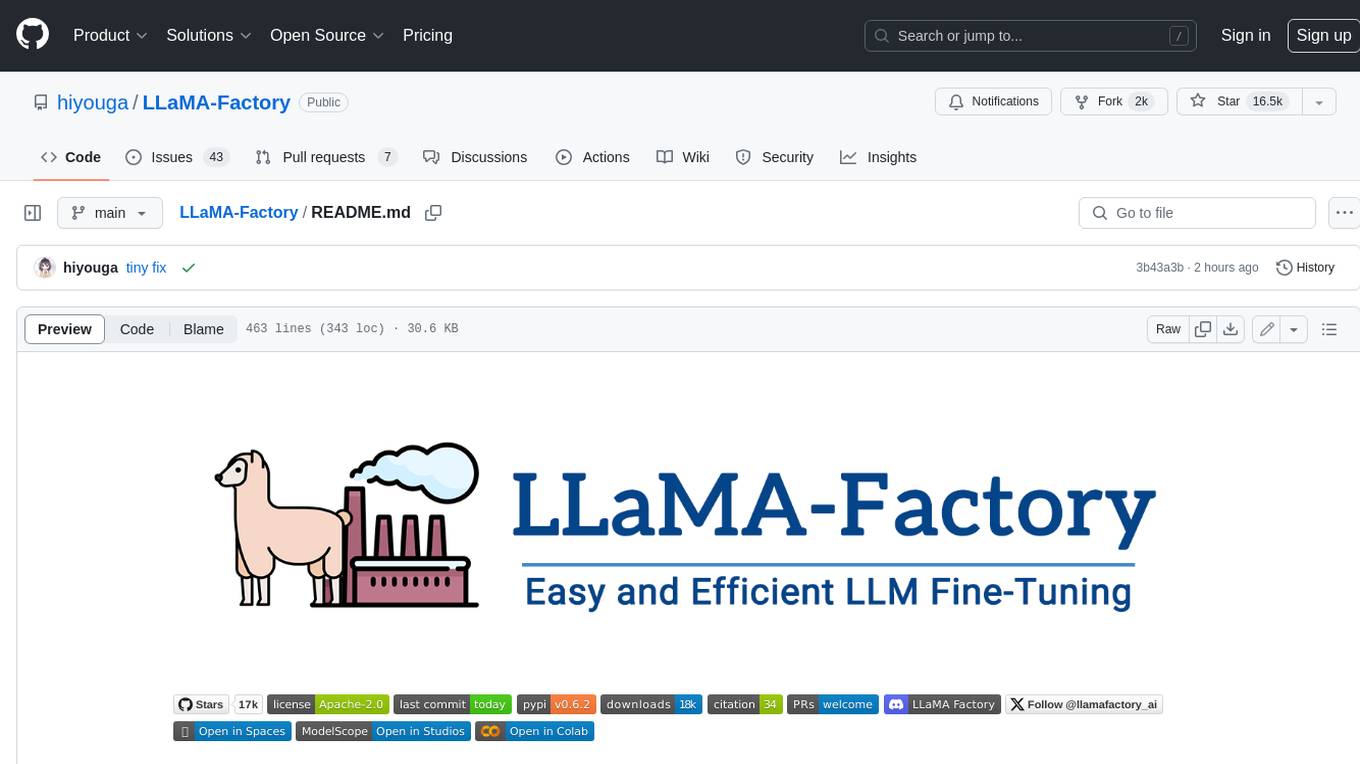
LLaMA-Factory
LLaMA Factory is a unified framework for fine-tuning 100+ large language models (LLMs) with various methods, including pre-training, supervised fine-tuning, reward modeling, PPO, DPO and ORPO. It features integrated algorithms like GaLore, BAdam, DoRA, LongLoRA, LLaMA Pro, LoRA+, LoftQ and Agent tuning, as well as practical tricks like FlashAttention-2, Unsloth, RoPE scaling, NEFTune and rsLoRA. LLaMA Factory provides experiment monitors like LlamaBoard, TensorBoard, Wandb, MLflow, etc., and supports faster inference with OpenAI-style API, Gradio UI and CLI with vLLM worker. Compared to ChatGLM's P-Tuning, LLaMA Factory's LoRA tuning offers up to 3.7 times faster training speed with a better Rouge score on the advertising text generation task. By leveraging 4-bit quantization technique, LLaMA Factory's QLoRA further improves the efficiency regarding the GPU memory.
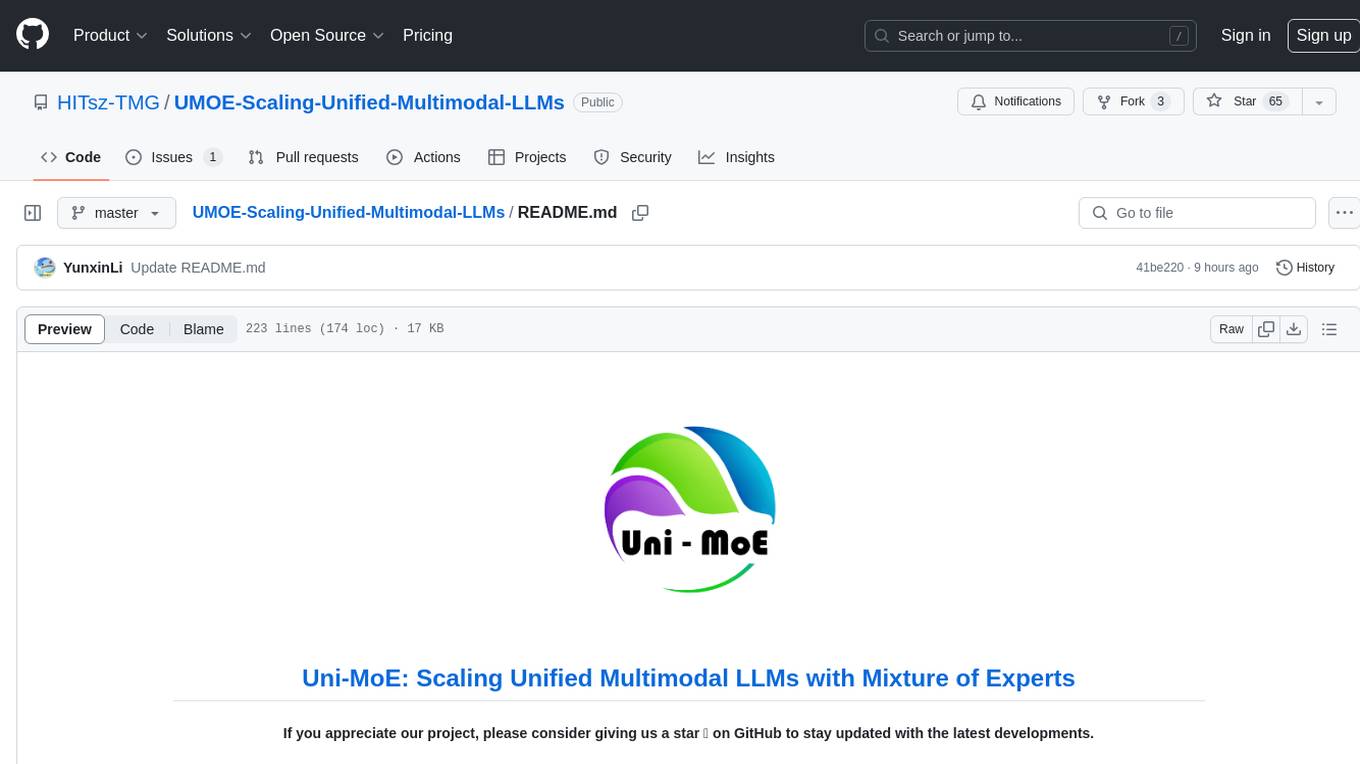
UMOE-Scaling-Unified-Multimodal-LLMs
Uni-MoE is a MoE-based unified multimodal model that can handle diverse modalities including audio, speech, image, text, and video. The project focuses on scaling Unified Multimodal LLMs with a Mixture of Experts framework. It offers enhanced functionality for training across multiple nodes and GPUs, as well as parallel processing at both the expert and modality levels. The model architecture involves three training stages: building connectors for multimodal understanding, developing modality-specific experts, and incorporating multiple trained experts into LLMs using the LoRA technique on mixed multimodal data. The tool provides instructions for installation, weights organization, inference, training, and evaluation on various datasets.
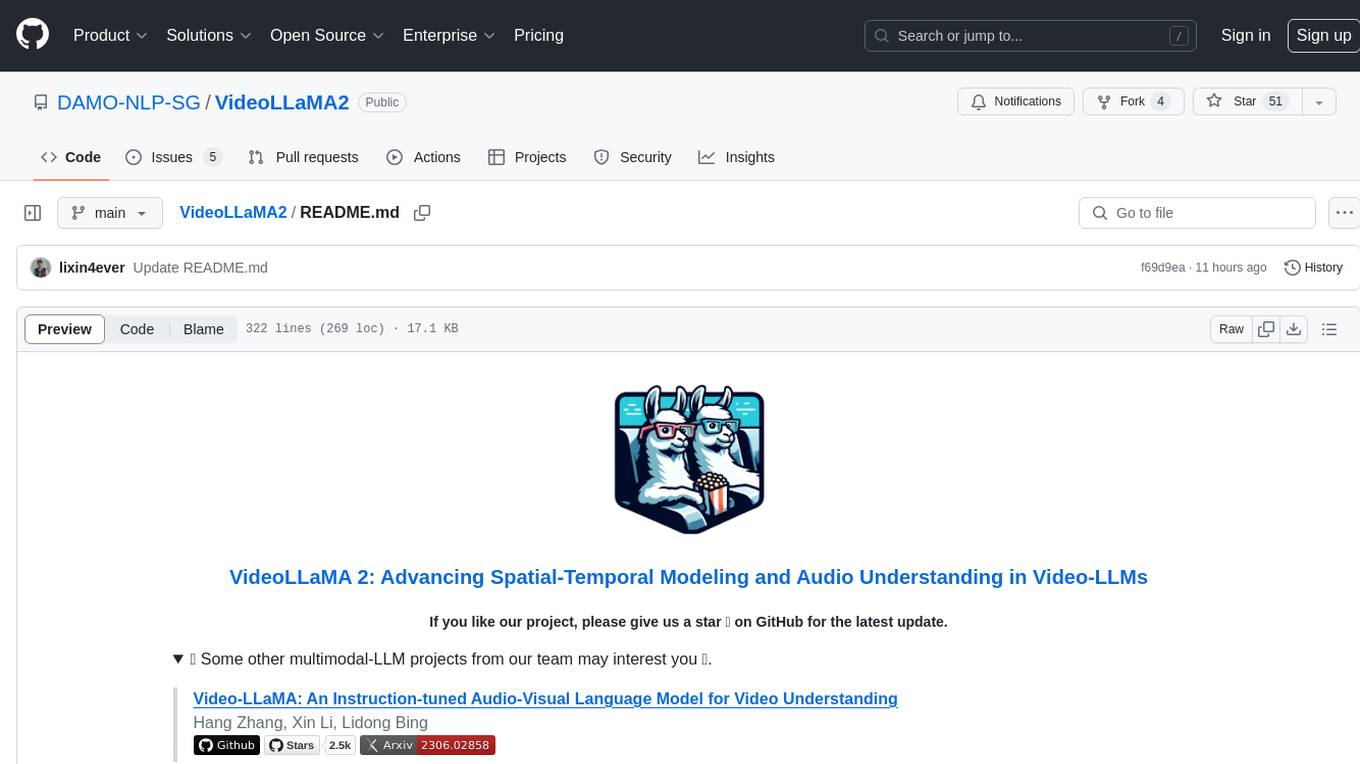
VideoLLaMA2
VideoLLaMA 2 is a project focused on advancing spatial-temporal modeling and audio understanding in video-LLMs. It provides tools for multi-choice video QA, open-ended video QA, and video captioning. The project offers model zoo with different configurations for visual encoder and language decoder. It includes training and evaluation guides, as well as inference capabilities for video and image processing. The project also features a demo setup for running a video-based Large Language Model web demonstration.
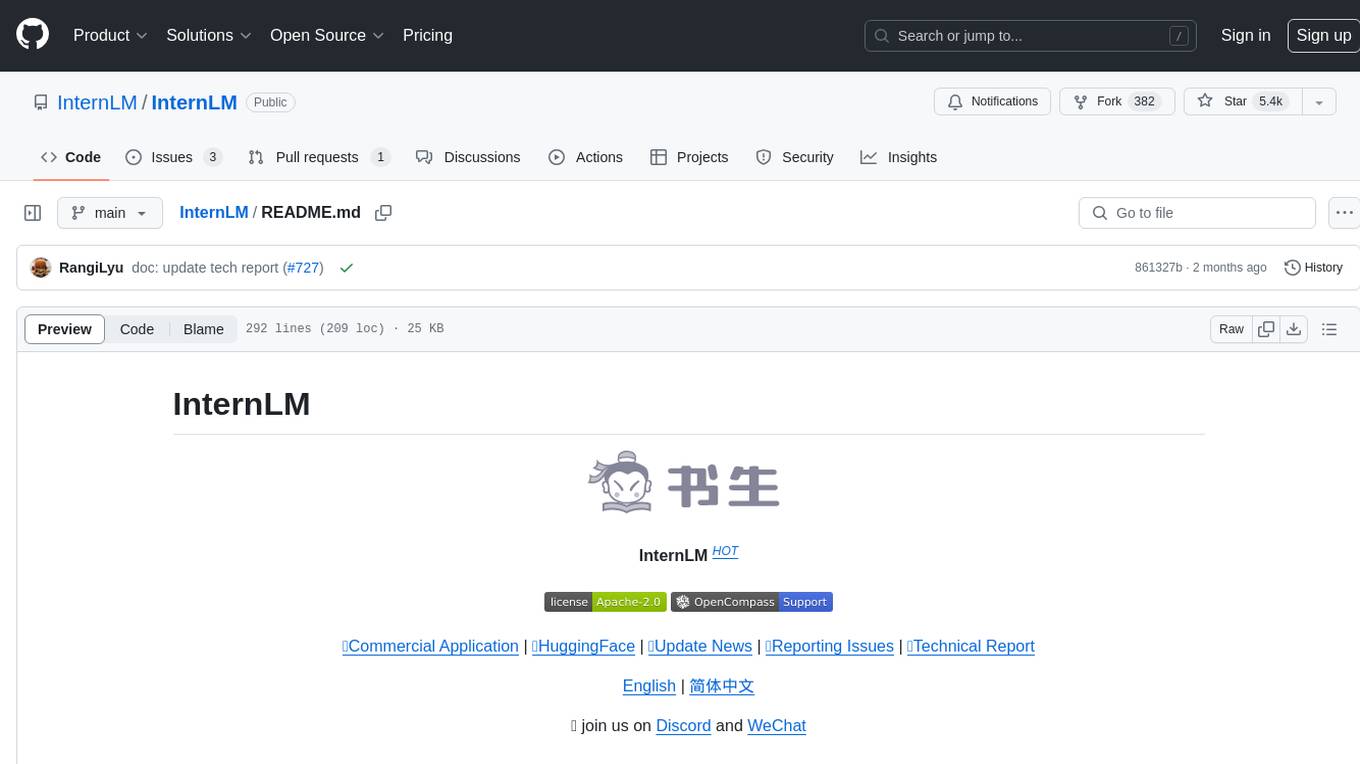
InternLM
InternLM is a powerful language model series with features such as 200K context window for long-context tasks, outstanding comprehensive performance in reasoning, math, code, chat experience, instruction following, and creative writing, code interpreter & data analysis capabilities, and stronger tool utilization capabilities. It offers models in sizes of 7B and 20B, suitable for research and complex scenarios. The models are recommended for various applications and exhibit better performance than previous generations. InternLM models may match or surpass other open-source models like ChatGPT. The tool has been evaluated on various datasets and has shown superior performance in multiple tasks. It requires Python >= 3.8, PyTorch >= 1.12.0, and Transformers >= 4.34 for usage. InternLM can be used for tasks like chat, agent applications, fine-tuning, deployment, and long-context inference.
helicone
Helicone is an open-source observability platform designed for Language Learning Models (LLMs). It logs requests to OpenAI in a user-friendly UI, offers caching, rate limits, and retries, tracks costs and latencies, provides a playground for iterating on prompts and chat conversations, supports collaboration, and will soon have APIs for feedback and evaluation. The platform is deployed on Cloudflare and consists of services like Web (NextJs), Worker (Cloudflare Workers), Jawn (Express), Supabase, and ClickHouse. Users can interact with Helicone locally by setting up the required services and environment variables. The platform encourages contributions and provides resources for learning, documentation, and integrations.
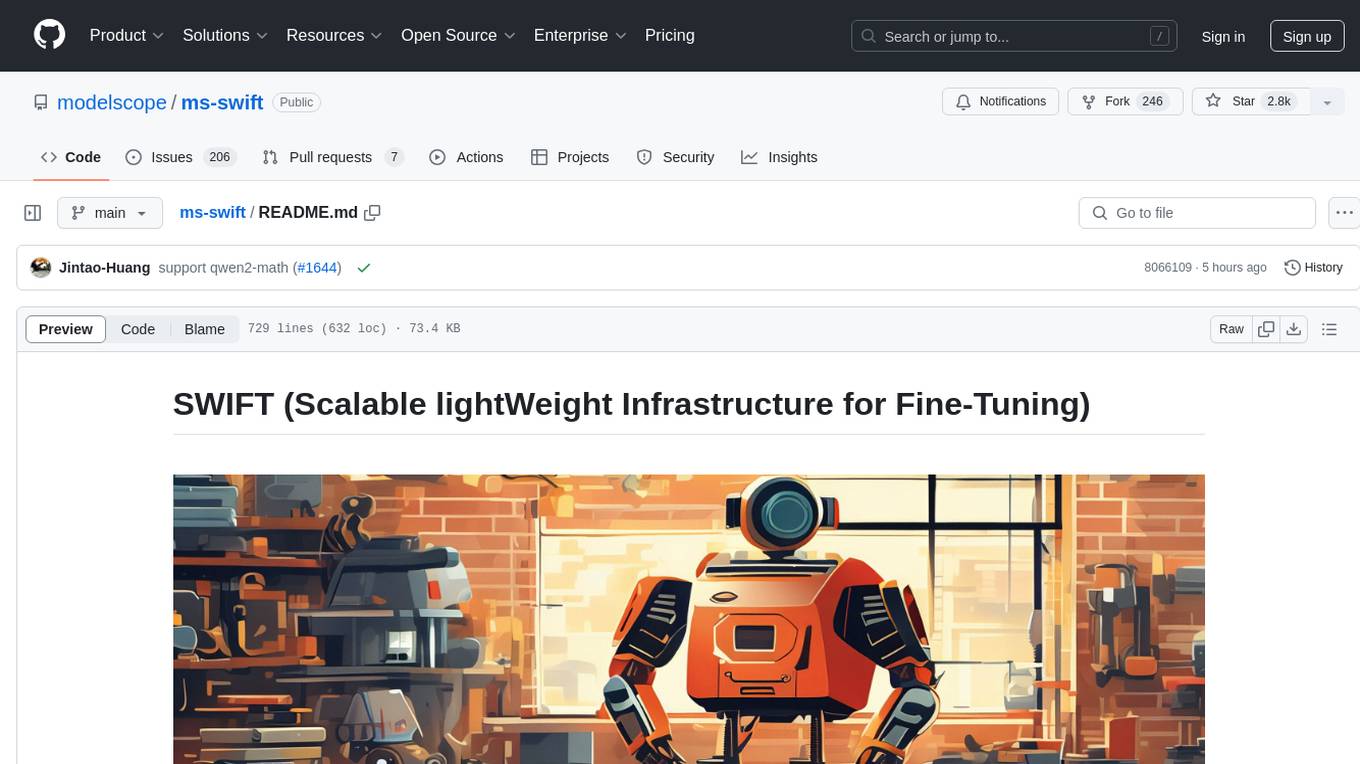
ms-swift
ms-swift is an official framework provided by the ModelScope community for fine-tuning and deploying large language models and multi-modal large models. It supports training, inference, evaluation, quantization, and deployment of over 400 large models and 100+ multi-modal large models. The framework includes various training technologies and accelerates inference, evaluation, and deployment modules. It offers a Gradio-based Web-UI interface and best practices for easy application of large models. ms-swift supports a wide range of model types, dataset types, hardware support, lightweight training methods, distributed training techniques, quantization training, RLHF training, multi-modal training, interface training, plugin and extension support, inference acceleration engines, model evaluation, and model quantization.
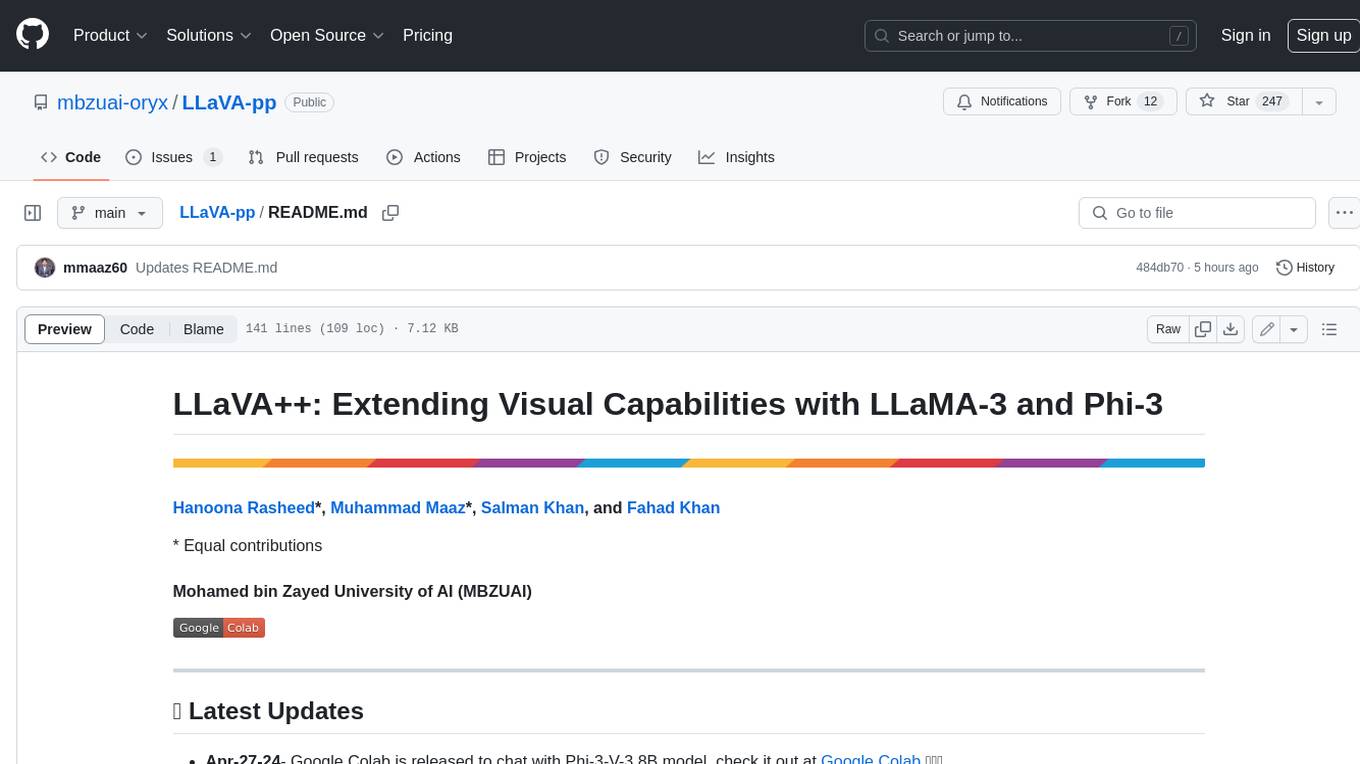
LLaVA-pp
This repository, LLaVA++, extends the visual capabilities of the LLaVA 1.5 model by incorporating the latest LLMs, Phi-3 Mini Instruct 3.8B, and LLaMA-3 Instruct 8B. It provides various models for instruction-following LMMS and academic-task-oriented datasets, along with training scripts for Phi-3-V and LLaMA-3-V. The repository also includes installation instructions and acknowledgments to related open-source contributions.

intel-extension-for-transformers
Intel® Extension for Transformers is an innovative toolkit designed to accelerate GenAI/LLM everywhere with the optimal performance of Transformer-based models on various Intel platforms, including Intel Gaudi2, Intel CPU, and Intel GPU. The toolkit provides the below key features and examples: * Seamless user experience of model compressions on Transformer-based models by extending [Hugging Face transformers](https://github.com/huggingface/transformers) APIs and leveraging [Intel® Neural Compressor](https://github.com/intel/neural-compressor) * Advanced software optimizations and unique compression-aware runtime (released with NeurIPS 2022's paper [Fast Distilbert on CPUs](https://arxiv.org/abs/2211.07715) and [QuaLA-MiniLM: a Quantized Length Adaptive MiniLM](https://arxiv.org/abs/2210.17114), and NeurIPS 2021's paper [Prune Once for All: Sparse Pre-Trained Language Models](https://arxiv.org/abs/2111.05754)) * Optimized Transformer-based model packages such as [Stable Diffusion](examples/huggingface/pytorch/text-to-image/deployment/stable_diffusion), [GPT-J-6B](examples/huggingface/pytorch/text-generation/deployment), [GPT-NEOX](examples/huggingface/pytorch/language-modeling/quantization#2-validated-model-list), [BLOOM-176B](examples/huggingface/pytorch/language-modeling/inference#BLOOM-176B), [T5](examples/huggingface/pytorch/summarization/quantization#2-validated-model-list), [Flan-T5](examples/huggingface/pytorch/summarization/quantization#2-validated-model-list), and end-to-end workflows such as [SetFit-based text classification](docs/tutorials/pytorch/text-classification/SetFit_model_compression_AGNews.ipynb) and [document level sentiment analysis (DLSA)](workflows/dlsa) * [NeuralChat](intel_extension_for_transformers/neural_chat), a customizable chatbot framework to create your own chatbot within minutes by leveraging a rich set of [plugins](https://github.com/intel/intel-extension-for-transformers/blob/main/intel_extension_for_transformers/neural_chat/docs/advanced_features.md) such as [Knowledge Retrieval](./intel_extension_for_transformers/neural_chat/pipeline/plugins/retrieval/README.md), [Speech Interaction](./intel_extension_for_transformers/neural_chat/pipeline/plugins/audio/README.md), [Query Caching](./intel_extension_for_transformers/neural_chat/pipeline/plugins/caching/README.md), and [Security Guardrail](./intel_extension_for_transformers/neural_chat/pipeline/plugins/security/README.md). This framework supports Intel Gaudi2/CPU/GPU. * [Inference](https://github.com/intel/neural-speed/tree/main) of Large Language Model (LLM) in pure C/C++ with weight-only quantization kernels for Intel CPU and Intel GPU (TBD), supporting [GPT-NEOX](https://github.com/intel/neural-speed/tree/main/neural_speed/models/gptneox), [LLAMA](https://github.com/intel/neural-speed/tree/main/neural_speed/models/llama), [MPT](https://github.com/intel/neural-speed/tree/main/neural_speed/models/mpt), [FALCON](https://github.com/intel/neural-speed/tree/main/neural_speed/models/falcon), [BLOOM-7B](https://github.com/intel/neural-speed/tree/main/neural_speed/models/bloom), [OPT](https://github.com/intel/neural-speed/tree/main/neural_speed/models/opt), [ChatGLM2-6B](https://github.com/intel/neural-speed/tree/main/neural_speed/models/chatglm), [GPT-J-6B](https://github.com/intel/neural-speed/tree/main/neural_speed/models/gptj), and [Dolly-v2-3B](https://github.com/intel/neural-speed/tree/main/neural_speed/models/gptneox). Support AMX, VNNI, AVX512F and AVX2 instruction set. We've boosted the performance of Intel CPUs, with a particular focus on the 4th generation Intel Xeon Scalable processor, codenamed [Sapphire Rapids](https://www.intel.com/content/www/us/en/products/docs/processors/xeon-accelerated/4th-gen-xeon-scalable-processors.html).
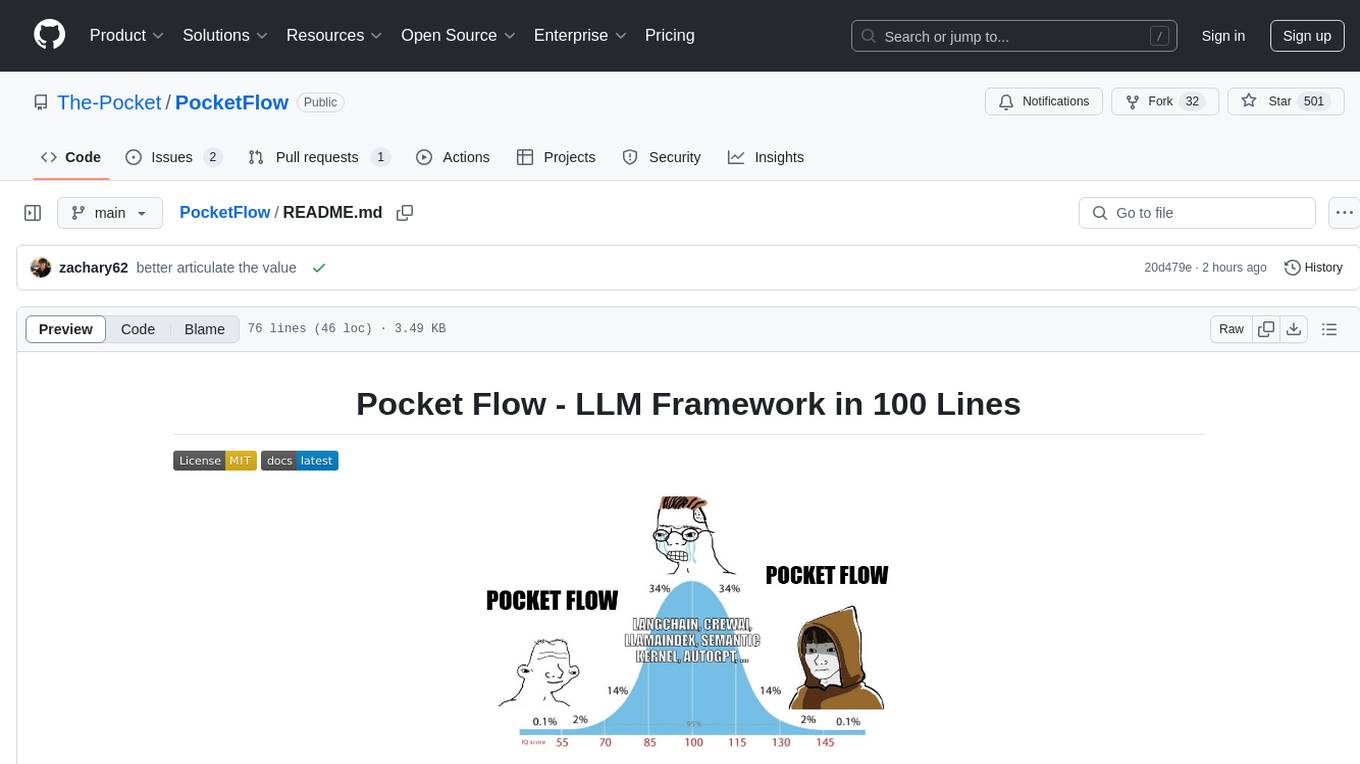
PocketFlow
Pocket Flow is a 100-line minimalist LLM framework designed for (Multi-)Agents, Workflow, RAG, etc. It provides a core abstraction for LLM projects by focusing on computation and communication through a graph structure and shared store. The framework aims to support the development of LLM Agents, such as Cursor AI, by offering a minimal and low-level approach that is well-suited for understanding and usage. Users can install Pocket Flow via pip or by copying the source code, and detailed documentation is available on the project website.
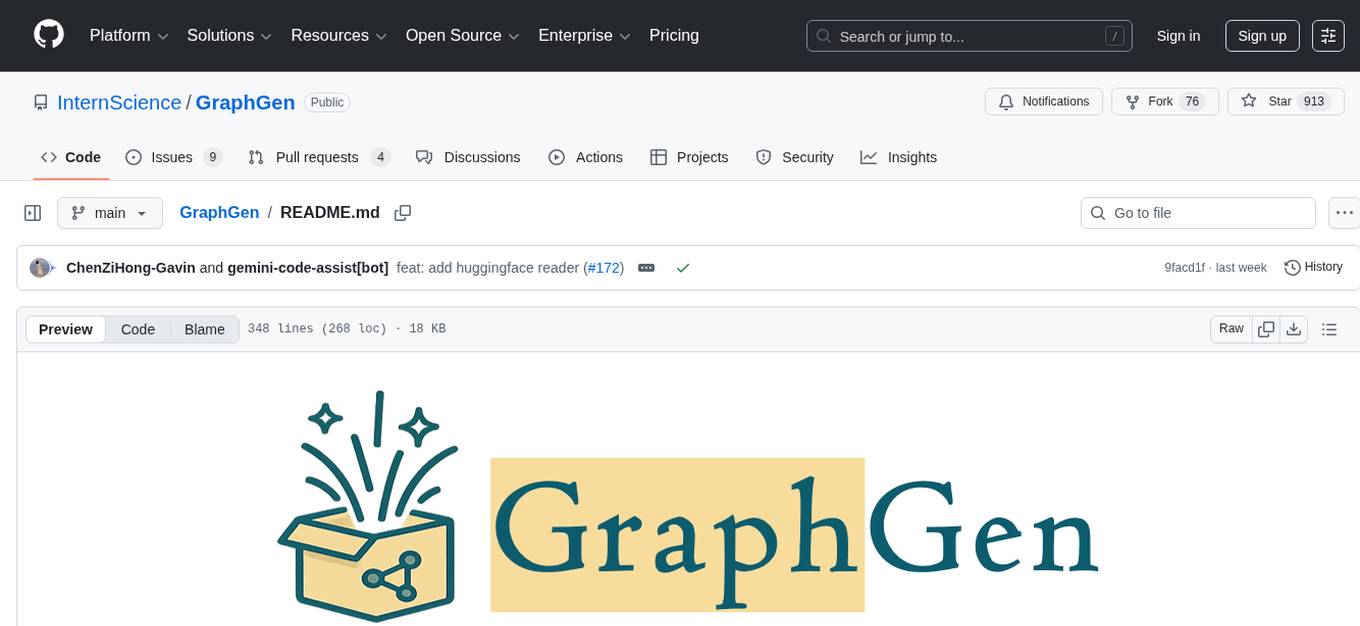
GraphGen
GraphGen is a framework for synthetic data generation guided by knowledge graphs. It enhances supervised fine-tuning for large language models (LLMs) by generating synthetic data based on a fine-grained knowledge graph. The tool identifies knowledge gaps in LLMs, prioritizes generating QA pairs targeting high-value knowledge, incorporates multi-hop neighborhood sampling, and employs style-controlled generation to diversify QA data. Users can use LLaMA-Factory and xtuner for fine-tuning LLMs after data generation.
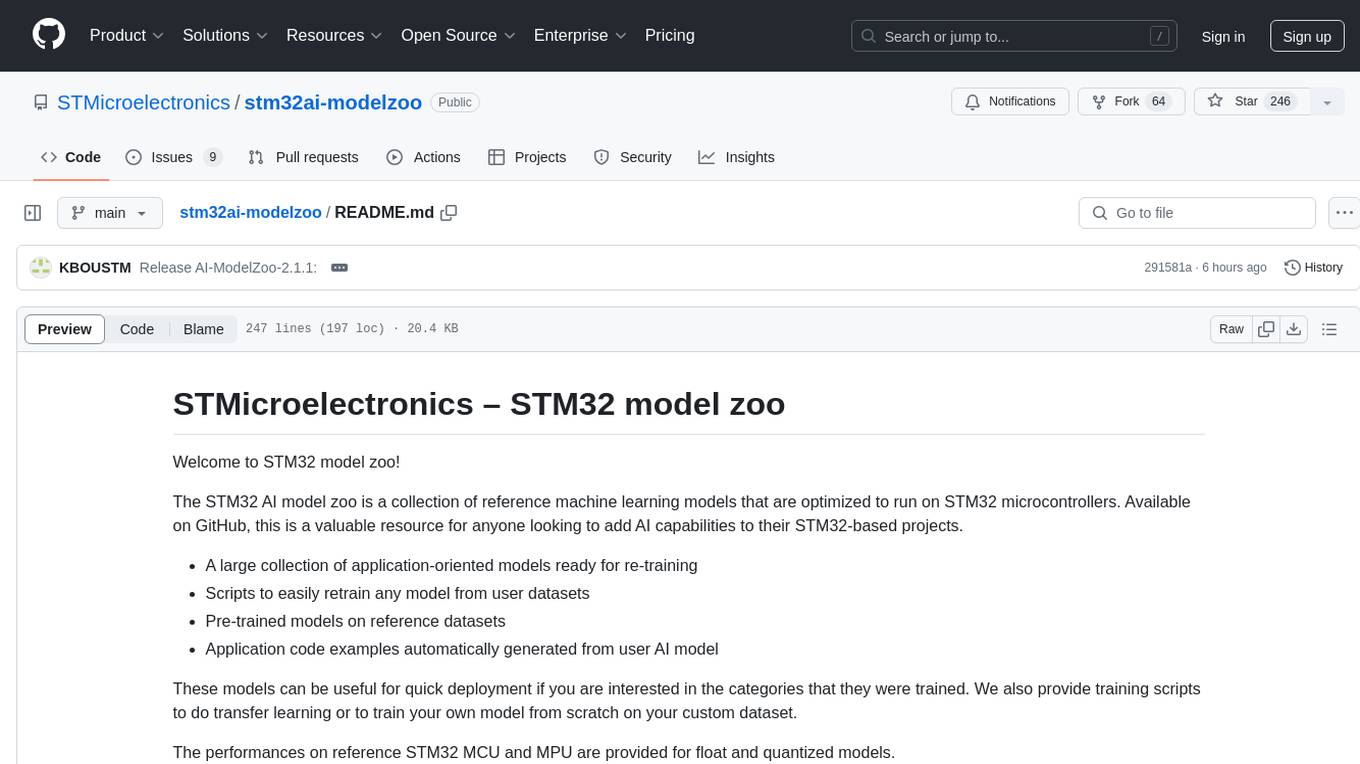
stm32ai-modelzoo
The STM32 AI model zoo is a collection of reference machine learning models optimized to run on STM32 microcontrollers. It provides a large collection of application-oriented models ready for re-training, scripts for easy retraining from user datasets, pre-trained models on reference datasets, and application code examples generated from user AI models. The project offers training scripts for transfer learning or training custom models from scratch. It includes performances on reference STM32 MCU and MPU for float and quantized models. The project is organized by application, providing step-by-step guides for training and deploying models.
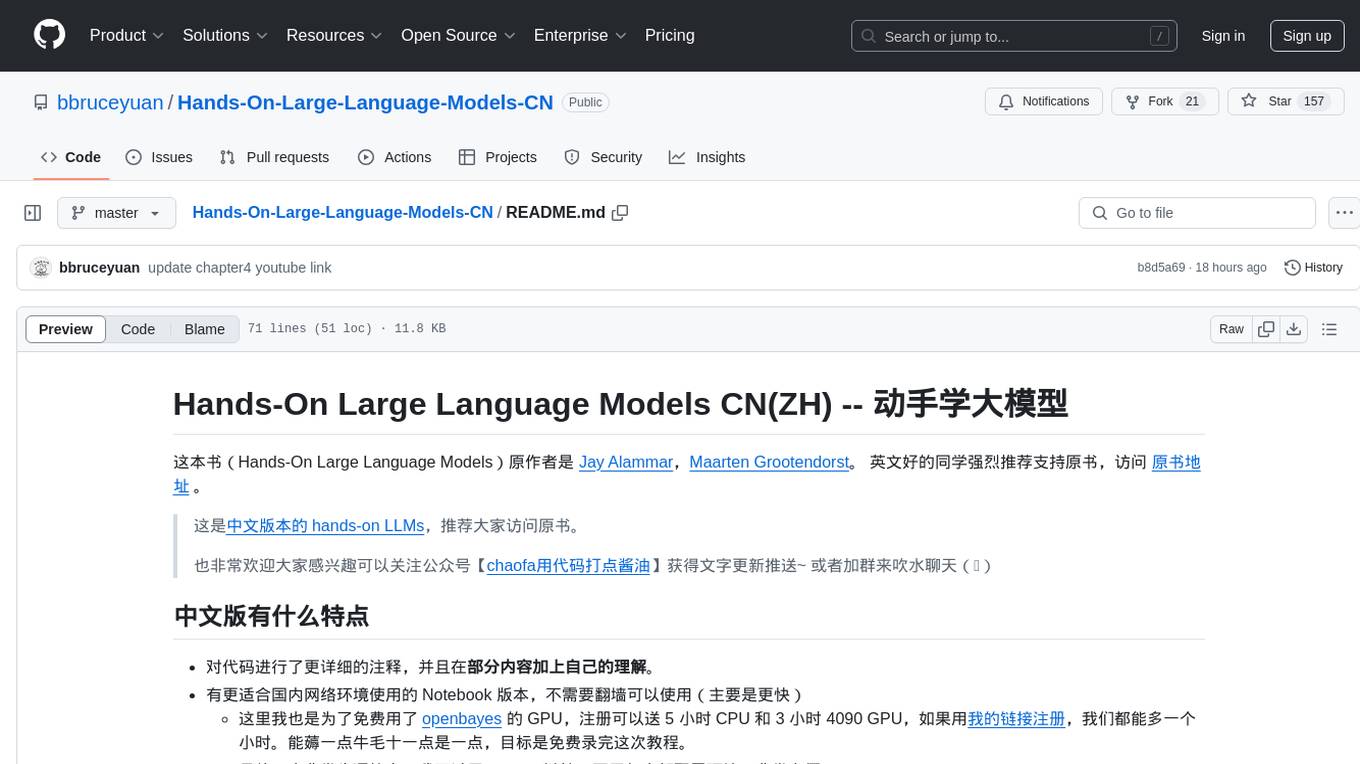
Hands-On-Large-Language-Models-CN
Hands-On Large Language Models CN(ZH) is a Chinese version of the book 'Hands-On Large Language Models' by Jay Alammar and Maarten Grootendorst. It provides detailed code annotations and additional insights, offers Notebook versions suitable for Chinese network environments, utilizes openbayes for free GPU access, allows convenient environment setup with vscode, and includes accompanying Chinese language videos on platforms like Bilibili and YouTube. The book covers various chapters on topics like Tokens and Embeddings, Transformer LLMs, Text Classification, Text Clustering, Prompt Engineering, Text Generation, Semantic Search, Multimodal LLMs, Text Embedding Models, Fine-tuning Models, and more.
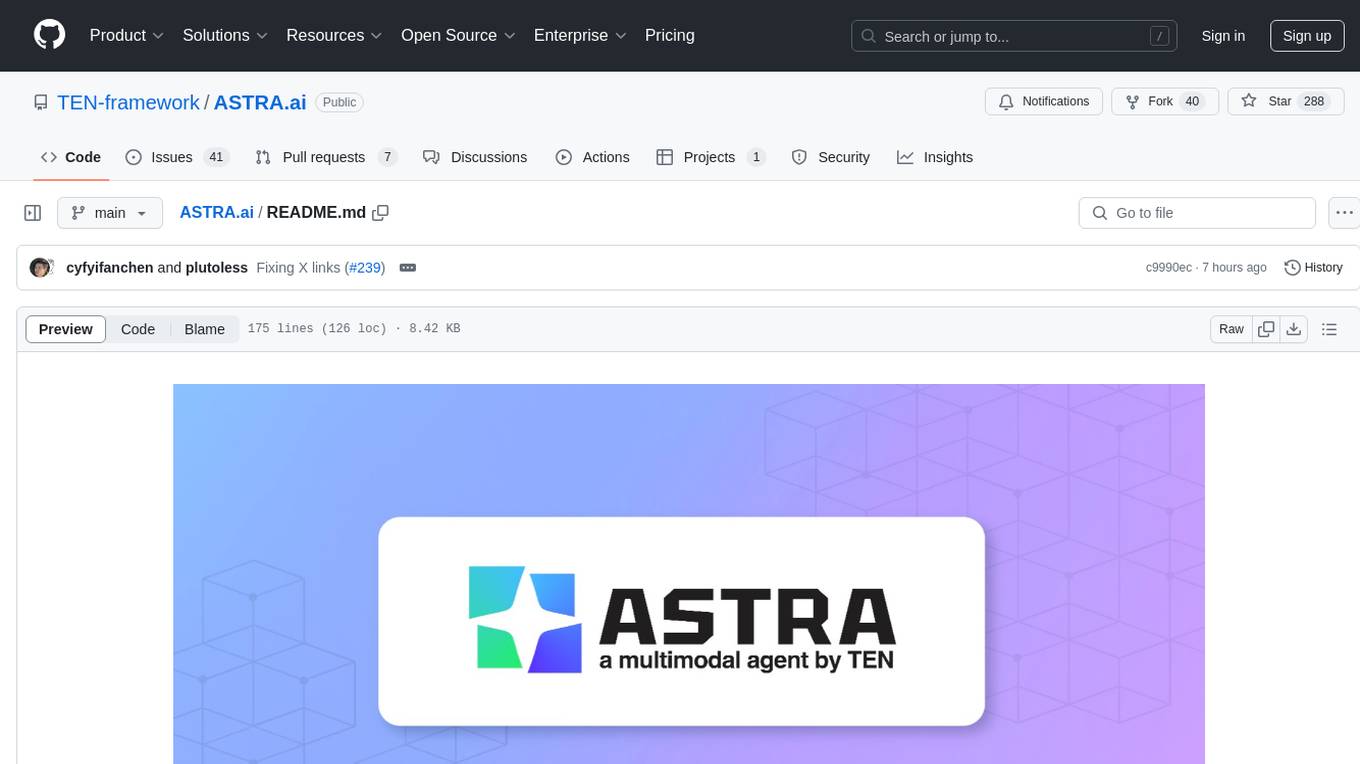
ASTRA.ai
Astra.ai is a multimodal agent powered by TEN, showcasing its capabilities in speech, vision, and reasoning through RAG from local documentation. It provides a platform for developing AI agents with features like RTC transportation, extension store, workflow builder, and local deployment. Users can build and test agents locally using Docker and Node.js, with prerequisites including Agora App ID, Azure's speech-to-text and text-to-speech API keys, and OpenAI API key. The platform offers advanced customization options through config files and API keys setup, enabling users to create and deploy their AI agents for various tasks.
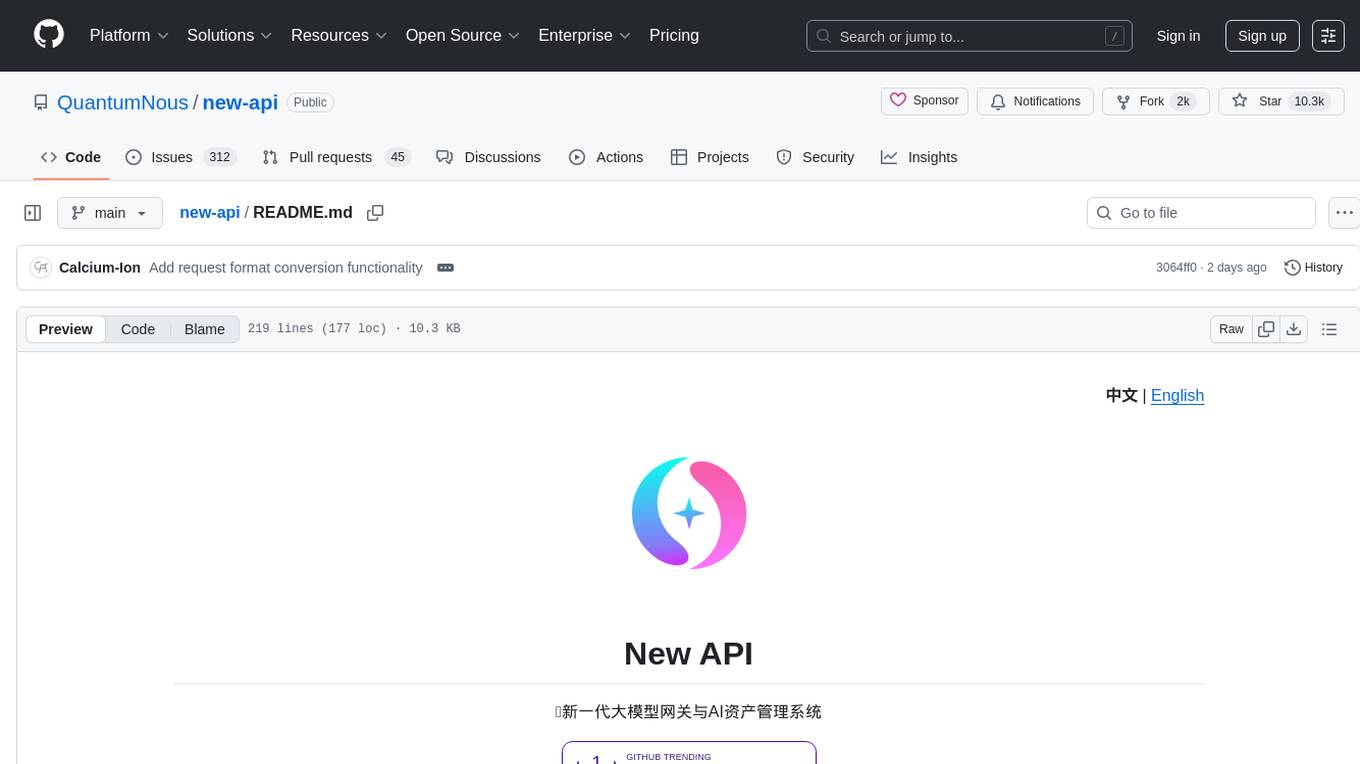
new-api
New API is a next-generation large model gateway and AI asset management system that provides a wide range of features, including a new UI interface, multi-language support, online recharge function, key query for usage quota, compatibility with the original One API database, model charging by usage count, channel weighted randomization, data dashboard, token grouping and model restrictions, support for various authorization login methods, support for Rerank models, OpenAI Realtime API, Claude Messages format, reasoning effort setting, content reasoning, user-specific model rate limiting, request format conversion, cache billing support, and various model support such as gpts, Midjourney-Proxy, Suno API, custom channels, Rerank models, Claude Messages format, Dify, and more.
For similar tasks
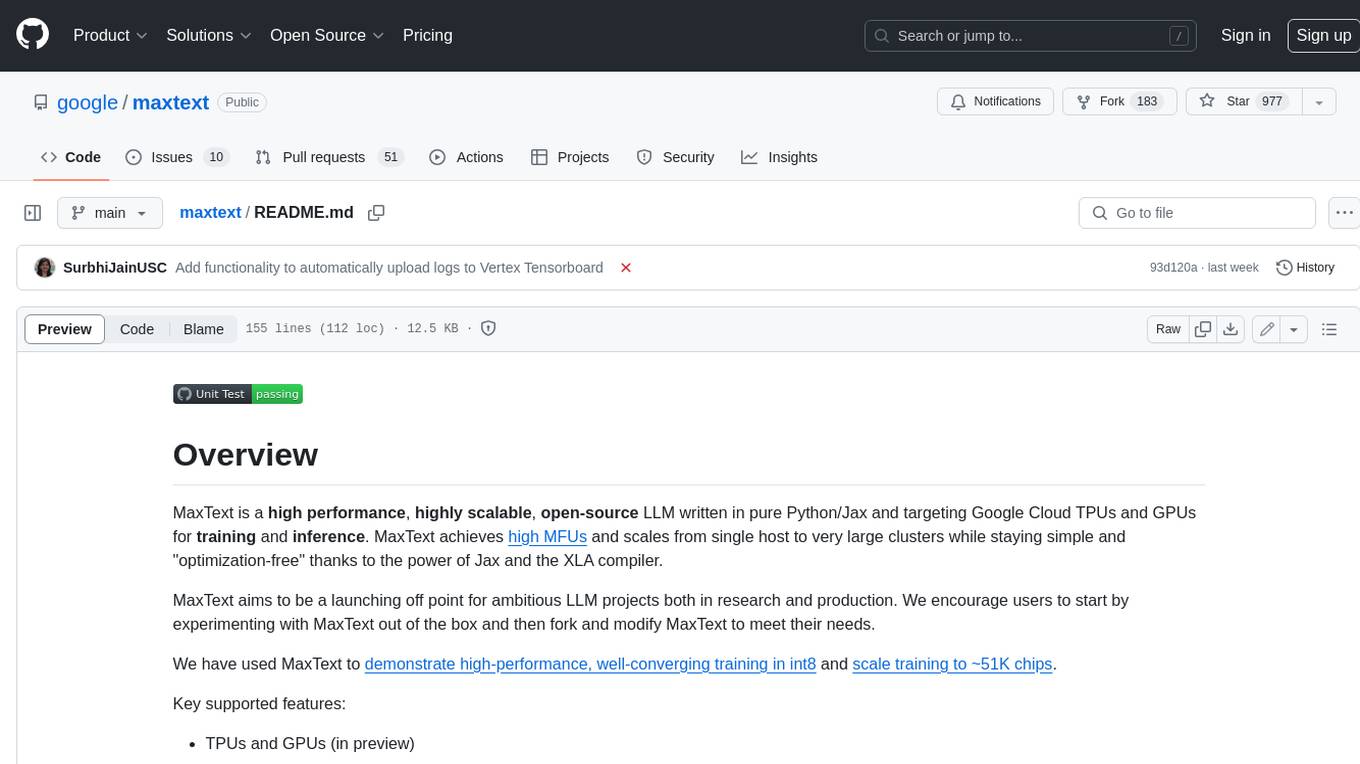
maxtext
MaxText is a high-performance, highly scalable, open-source LLM written in pure Python/Jax and targeting Google Cloud TPUs and GPUs for training and inference. MaxText achieves high MFUs and scales from single host to very large clusters while staying simple and "optimization-free" thanks to the power of Jax and the XLA compiler. MaxText aims to be a launching off point for ambitious LLM projects both in research and production. We encourage users to start by experimenting with MaxText out of the box and then fork and modify MaxText to meet their needs.

swift
SWIFT (Scalable lightWeight Infrastructure for Fine-Tuning) supports training, inference, evaluation and deployment of nearly **200 LLMs and MLLMs** (multimodal large models). Developers can directly apply our framework to their own research and production environments to realize the complete workflow from model training and evaluation to application. In addition to supporting the lightweight training solutions provided by [PEFT](https://github.com/huggingface/peft), we also provide a complete **Adapters library** to support the latest training techniques such as NEFTune, LoRA+, LLaMA-PRO, etc. This adapter library can be used directly in your own custom workflow without our training scripts. To facilitate use by users unfamiliar with deep learning, we provide a Gradio web-ui for controlling training and inference, as well as accompanying deep learning courses and best practices for beginners. Additionally, we are expanding capabilities for other modalities. Currently, we support full-parameter training and LoRA training for AnimateDiff.
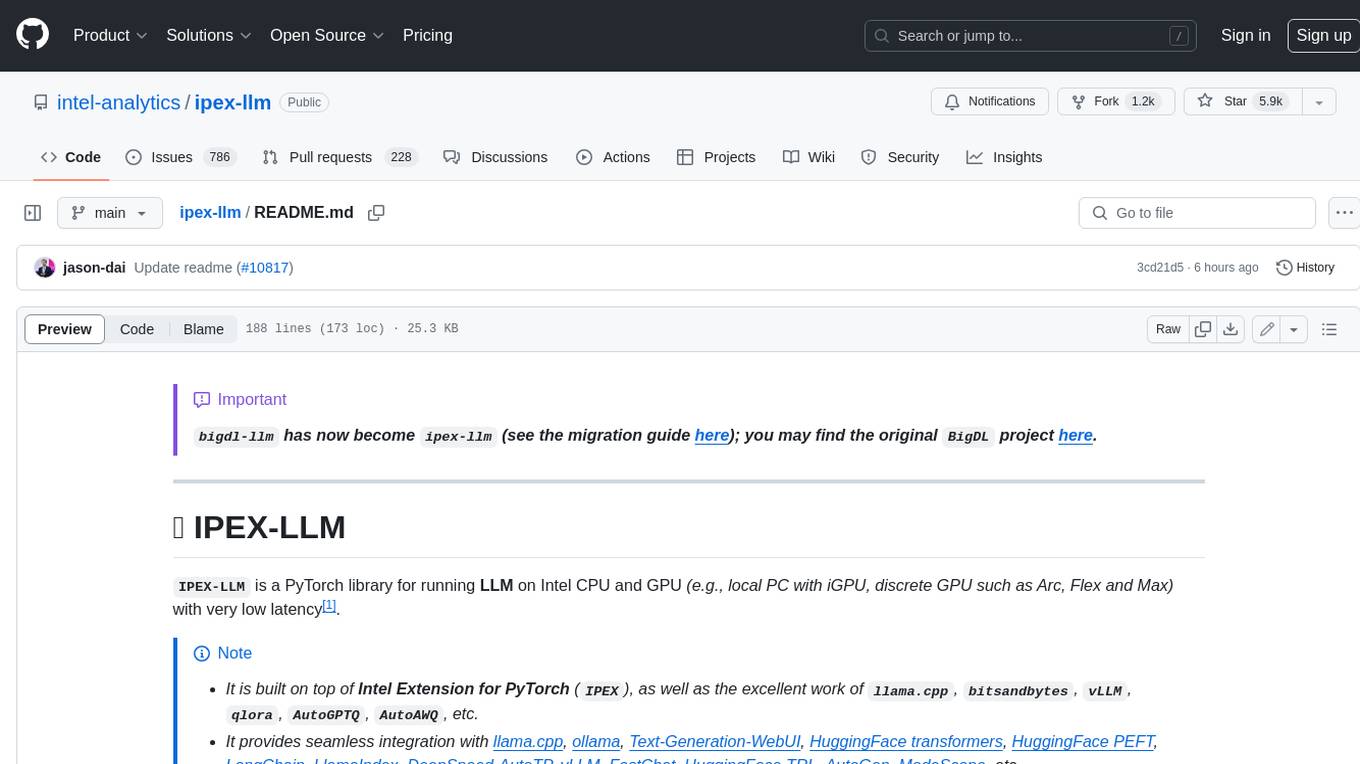
ipex-llm
IPEX-LLM is a PyTorch library for running Large Language Models (LLMs) on Intel CPUs and GPUs with very low latency. It provides seamless integration with various LLM frameworks and tools, including llama.cpp, ollama, Text-Generation-WebUI, HuggingFace transformers, and more. IPEX-LLM has been optimized and verified on over 50 LLM models, including LLaMA, Mistral, Mixtral, Gemma, LLaVA, Whisper, ChatGLM, Baichuan, Qwen, and RWKV. It supports a range of low-bit inference formats, including INT4, FP8, FP4, INT8, INT2, FP16, and BF16, as well as finetuning capabilities for LoRA, QLoRA, DPO, QA-LoRA, and ReLoRA. IPEX-LLM is actively maintained and updated with new features and optimizations, making it a valuable tool for researchers, developers, and anyone interested in exploring and utilizing LLMs.
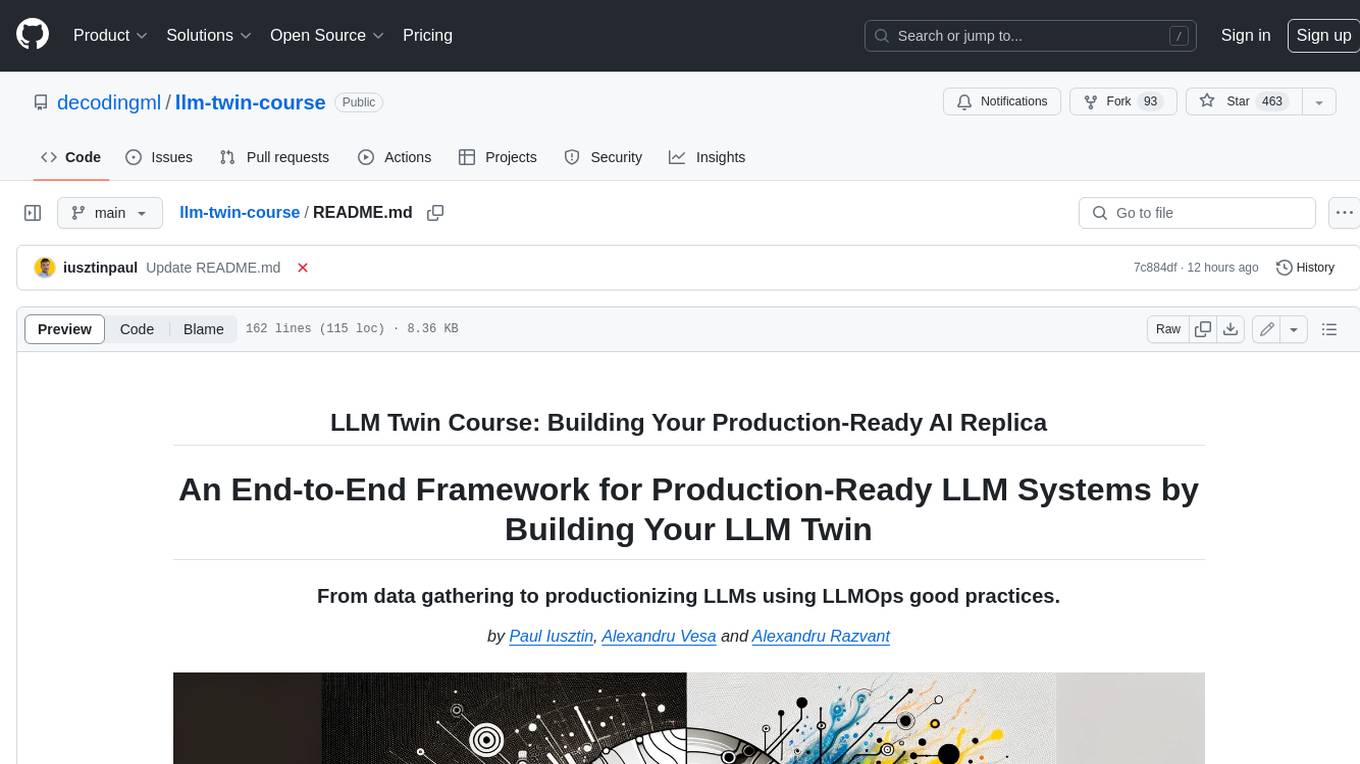
llm-twin-course
The LLM Twin Course is a free, end-to-end framework for building production-ready LLM systems. It teaches you how to design, train, and deploy a production-ready LLM twin of yourself powered by LLMs, vector DBs, and LLMOps good practices. The course is split into 11 hands-on written lessons and the open-source code you can access on GitHub. You can read everything and try out the code at your own pace.
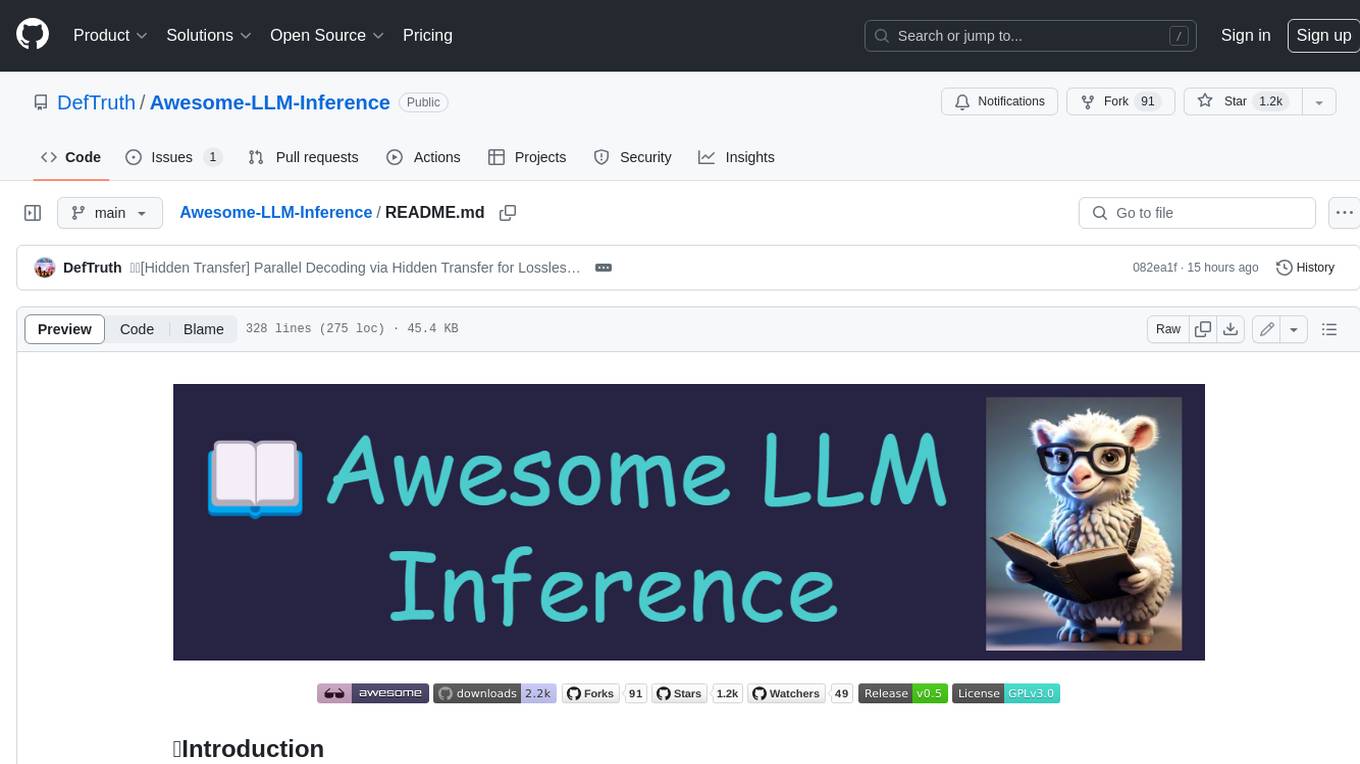
Awesome-LLM-Inference
Awesome-LLM-Inference: A curated list of 📙Awesome LLM Inference Papers with Codes, check 📖Contents for more details. This repo is still updated frequently ~ 👨💻 Welcome to star ⭐️ or submit a PR to this repo!
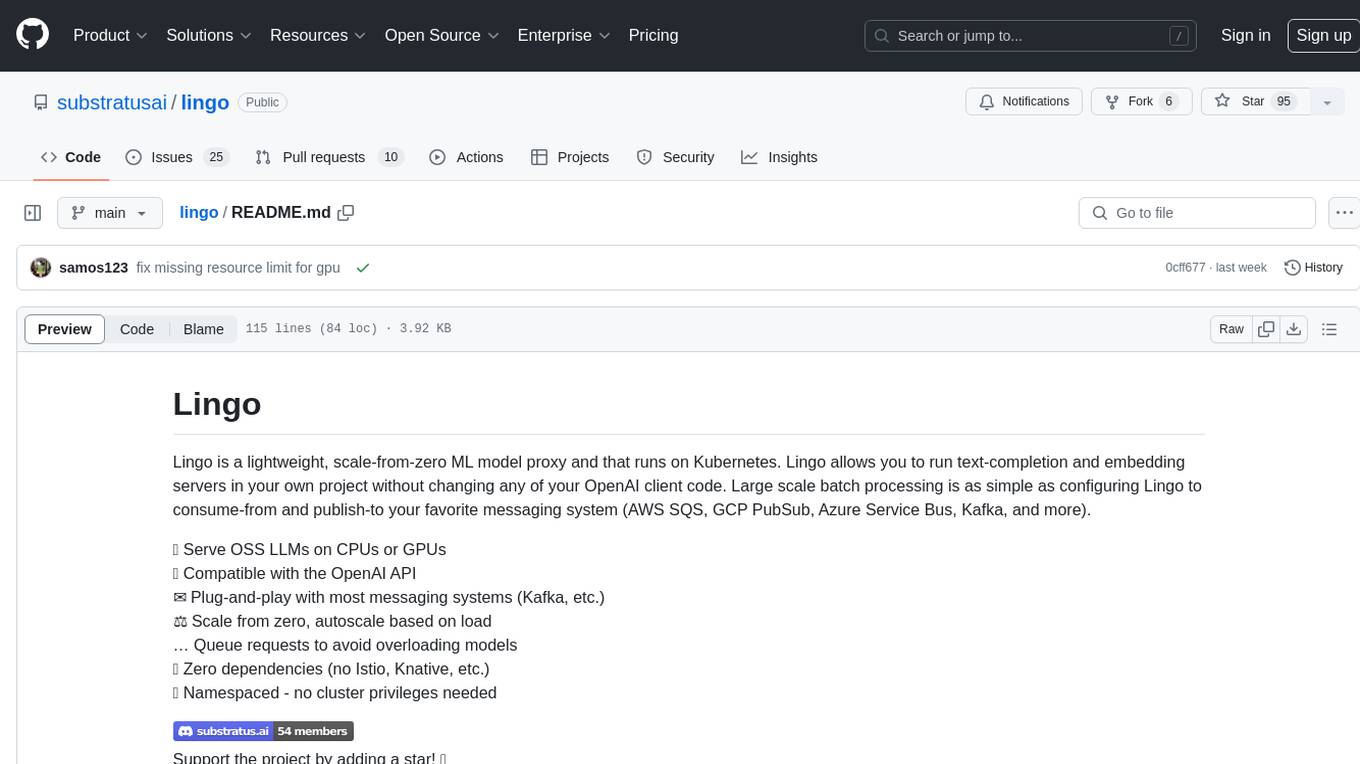
lingo
Lingo is a lightweight ML model proxy that runs on Kubernetes, allowing you to run text-completion and embedding servers without changing OpenAI client code. It supports serving OSS LLMs, is compatible with OpenAI API, plug-and-play with messaging systems, scales from zero based on load, and has zero dependencies. Namespaced with no cluster privileges needed.
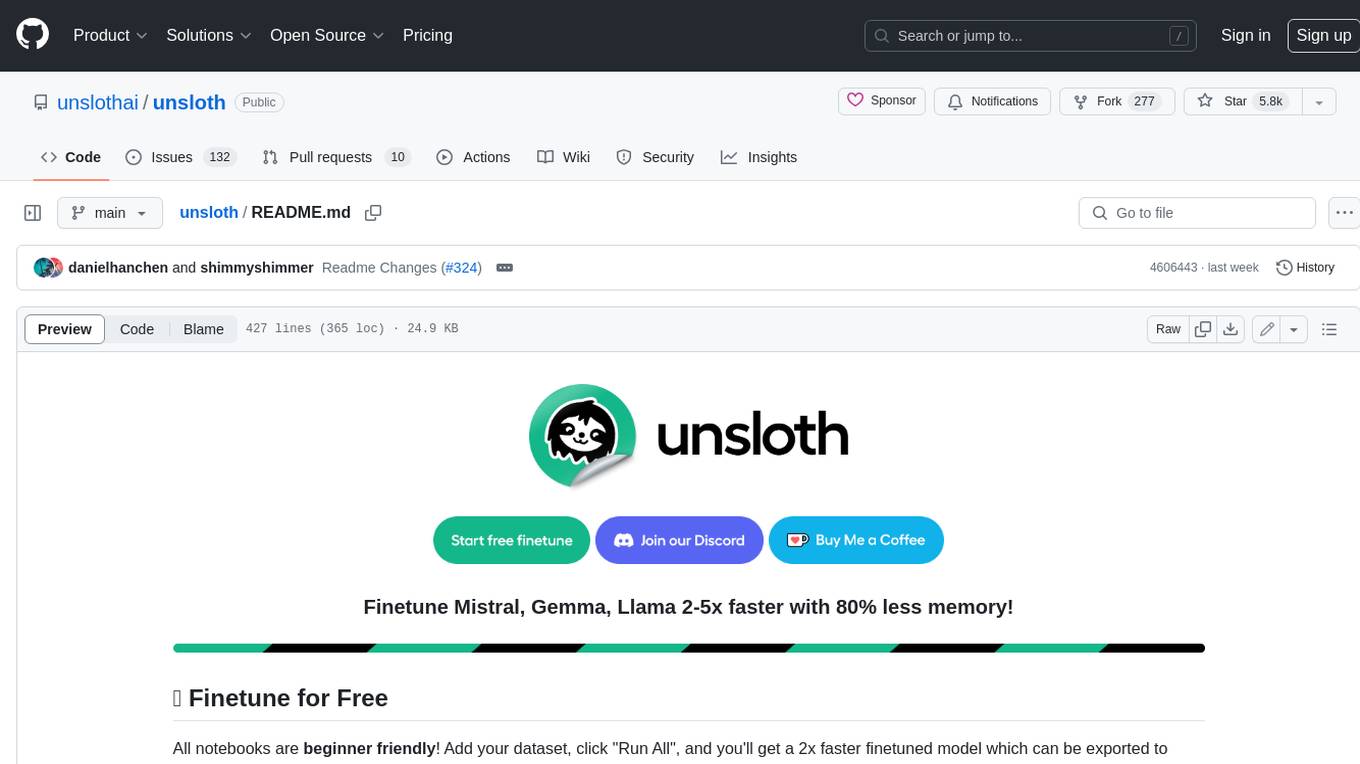
unsloth
Unsloth is a tool that allows users to fine-tune large language models (LLMs) 2-5x faster with 80% less memory. It is a free and open-source tool that can be used to fine-tune LLMs such as Gemma, Mistral, Llama 2-5, TinyLlama, and CodeLlama 34b. Unsloth supports 4-bit and 16-bit QLoRA / LoRA fine-tuning via bitsandbytes. It also supports DPO (Direct Preference Optimization), PPO, and Reward Modelling. Unsloth is compatible with Hugging Face's TRL, Trainer, Seq2SeqTrainer, and Pytorch code. It is also compatible with NVIDIA GPUs since 2018+ (minimum CUDA Capability 7.0).
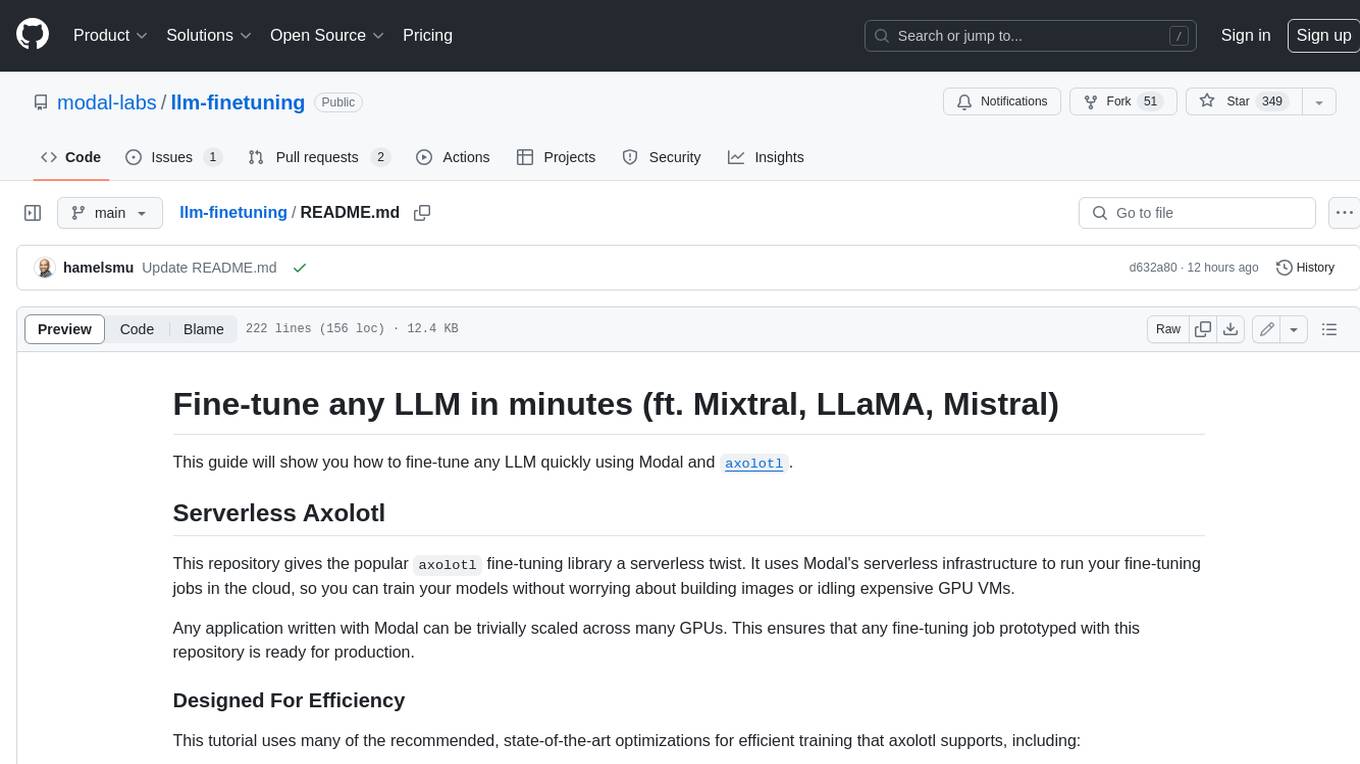
llm-finetuning
llm-finetuning is a repository that provides a serverless twist to the popular axolotl fine-tuning library using Modal's serverless infrastructure. It allows users to quickly fine-tune any LLM model with state-of-the-art optimizations like Deepspeed ZeRO, LoRA adapters, Flash attention, and Gradient checkpointing. The repository simplifies the fine-tuning process by not exposing all CLI arguments, instead allowing users to specify options in a config file. It supports efficient training and scaling across multiple GPUs, making it suitable for production-ready fine-tuning jobs.
For similar jobs

sweep
Sweep is an AI junior developer that turns bugs and feature requests into code changes. It automatically handles developer experience improvements like adding type hints and improving test coverage.

teams-ai
The Teams AI Library is a software development kit (SDK) that helps developers create bots that can interact with Teams and Microsoft 365 applications. It is built on top of the Bot Framework SDK and simplifies the process of developing bots that interact with Teams' artificial intelligence capabilities. The SDK is available for JavaScript/TypeScript, .NET, and Python.

ai-guide
This guide is dedicated to Large Language Models (LLMs) that you can run on your home computer. It assumes your PC is a lower-end, non-gaming setup.

classifai
Supercharge WordPress Content Workflows and Engagement with Artificial Intelligence. Tap into leading cloud-based services like OpenAI, Microsoft Azure AI, Google Gemini and IBM Watson to augment your WordPress-powered websites. Publish content faster while improving SEO performance and increasing audience engagement. ClassifAI integrates Artificial Intelligence and Machine Learning technologies to lighten your workload and eliminate tedious tasks, giving you more time to create original content that matters.

chatbot-ui
Chatbot UI is an open-source AI chat app that allows users to create and deploy their own AI chatbots. It is easy to use and can be customized to fit any need. Chatbot UI is perfect for businesses, developers, and anyone who wants to create a chatbot.

BricksLLM
BricksLLM is a cloud native AI gateway written in Go. Currently, it provides native support for OpenAI, Anthropic, Azure OpenAI and vLLM. BricksLLM aims to provide enterprise level infrastructure that can power any LLM production use cases. Here are some use cases for BricksLLM: * Set LLM usage limits for users on different pricing tiers * Track LLM usage on a per user and per organization basis * Block or redact requests containing PIIs * Improve LLM reliability with failovers, retries and caching * Distribute API keys with rate limits and cost limits for internal development/production use cases * Distribute API keys with rate limits and cost limits for students

uAgents
uAgents is a Python library developed by Fetch.ai that allows for the creation of autonomous AI agents. These agents can perform various tasks on a schedule or take action on various events. uAgents are easy to create and manage, and they are connected to a fast-growing network of other uAgents. They are also secure, with cryptographically secured messages and wallets.

griptape
Griptape is a modular Python framework for building AI-powered applications that securely connect to your enterprise data and APIs. It offers developers the ability to maintain control and flexibility at every step. Griptape's core components include Structures (Agents, Pipelines, and Workflows), Tasks, Tools, Memory (Conversation Memory, Task Memory, and Meta Memory), Drivers (Prompt and Embedding Drivers, Vector Store Drivers, Image Generation Drivers, Image Query Drivers, SQL Drivers, Web Scraper Drivers, and Conversation Memory Drivers), Engines (Query Engines, Extraction Engines, Summary Engines, Image Generation Engines, and Image Query Engines), and additional components (Rulesets, Loaders, Artifacts, Chunkers, and Tokenizers). Griptape enables developers to create AI-powered applications with ease and efficiency.







